#he should have consulted a psychologist
Text
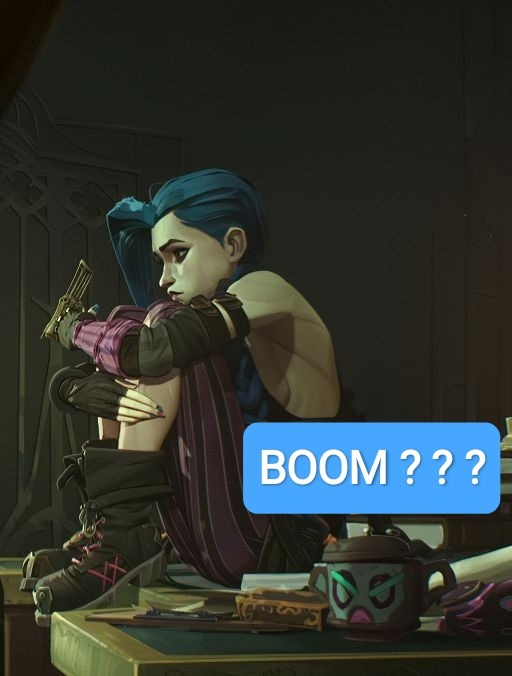
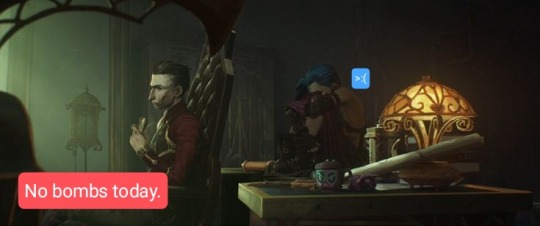
Three hours later...
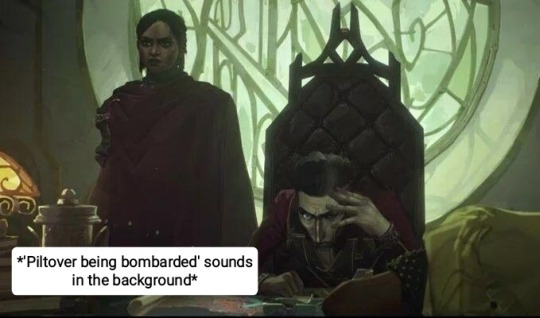
#Silco's fault#he should have consulted a psychologist#that girl's ✨addicted✨ to big booms#(and Parent killing)#( but yeah )#(let's not talk about that)#poor Sevika#she didn't signed up for this#arcane memes#league of legends#arcane#league of legends meme#lol#lol memes#arcane silco#jinx arcane#arcane netflix#jinx lol#jinx league of legends#powder#because why not#silco and jinx#silco arcane#jinx and silco#jinx and bombs#Jinx x therapy#jinx X mental health#incorrect quotes#incorrect arcane quotes#arcane incorrect quotes
225 notes
·
View notes
Text
Stick to What You Know.
Sneak peek: Reader is asked to join the BAU by none other than Director Cruz himself. She is a child psychologist and Cruz thought she would make a great asset; it would seem though that Agent Hotchner doesn’t agree.
Aaron Hotchner x (Fem) Reader
Angst
Word count: 3134
Guys...I feel like this is shit, I wrote it in like 3 hours soo…. it’s not edited - please be kind. Requests are open and feedback is welcome if it's constructive!
Warnings: My blog is 18+, minors DNI, implied age gap, some language, one use of y/n I think, Hotch is a DICK in this for a minute (SORRY), reader has children, talk of dissociative identity disorder (in reference to a case), canon case talk/info, mention of murder (in reference to a case), Reader in a child psychologist, reader is friends with Director Mateo Cruz, implied death of Haley. I think that’s all, let me know if I missed anything!!
I do not consent to having my work translated or reposted to any other site. That being said I do not own the characters portrayed in this story.
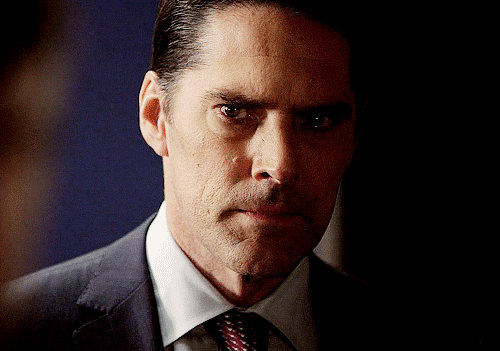
You were so late. You were thanking the lord that you knew Mateo well from having previously worked with him, otherwise your lateness would probably come across as a lack of seriousness or appreciation for the strings he had pulled to get you here. And of course, being lost in thought while simultaneously rushing through an unfamiliar building had you barreling into a handsome stranger…or maybe a handsome acquaintance.
“I am so sorry!” You’d hurried out.
His large hands steadied you with a gentle but firm grasp on your arms. Your eyes glance upward to meet his.
“No worries, are you alright?” He offered.
“I’m good thank you. Wait, you’re Aaron Hotchner, I’ve sat in on a few of your lectures at the university.”
“I am, and thank you, I hope you were able to take something from them.” He blushed.
“I did, oh shoot sorry! I have to go; I am so late!” You said, speed walking away from him.
Aaron couldn’t help but watch as you walked away from him. And you couldn’t help but think to yourself that he was far more handsome up close.

After explaining your tardiness to Mateo, he led you to the sixth floor to officially meet your new team. The rest of them anyway.
“Mat, you told them I was joining right? I ran into Agent Hotchner, and he didn’t show any signs of recognition. And I told you I didn’t want to join a team who wasn’t ready and willing to have me.” You ranted.
“Yes I told him, you have nothing to worry about.” He lied. “You head down into the bullpen and meet the agents; I will go up and talk to Agent Hotchner.”
You nodded in agreement and made your way to Emily and Spencer. You exchanged greetings, and Emily took you around to meet everyone else.

“Director Cruz, what can I do for you?” Hotch asked.
“I have a new recruit for you. She will be starting today.” Mateo gestured toward the window.
Aaron glanced out, finding the beautiful woman from this morning standing amongst his team. Morgan must’ve tried to harm her because she threw her head back in laughter with the most beautiful smile. Why her? Why did she have to be joining his team?
“Why didn’t I receive her file?”
“Truthfully Aaron, I didn’t have it together. She and I have worked together on some classified cases. But I have a file here with some of her info. She specializes in child psychology which is something your team is lacking, I figured that she could work with your team on all of your child related cases, but then can occasionally consult with other teams should they need her expertise.” Mateo explained.
“Okay.”

It had been three months since then, and things had not been going well. You had gone on all but one case with the BAU since you’d started. Every single time, Aaron kept you at the local precincts, not allowing you out on any real field work – this was hindering your ability to do your job effectively. You needed to observe the unsub’s home and belongings and dumpsites etc. but he was denying you the opportunity.
The rest of the team had been nothing but welcoming, inviting you into their little family with open arms. None of them could have predicted that Hotch would ice you out the way he was.
Every time you offered a theory or statistic or any sort of information, Hotch shut you down. He would belittle you, constantly making you feel small, and he purposely called you agent instead of referring to you as doctor and well, why should today be any different.
You had been called out on a case and based on all the information the team had acquired so far, you had a pretty good working theory.
JJ, Spencer, and you had been sitting in the room the local precinct had designated as yours for the duration of the case.
“I have an idea…it’s a little out there but hear me out,” You started, your gaze shifting to JJ and Spencer, who both encouraged you to continue. “Okay, so some of the details in this case match, while others are all over the place, like the MO is essentially the same but some of the victims’ injuries show signs of hesitation where others show none, I know hotch mentioned multiple unsubs, but what if it is one unsub, with multiple personalities.”
“Like dissociative identity disorder. You know that would make a lot of sense considering people with DID tend to have highly varying alters or identities. They can range in race, gender, age which would explain why the murders have been so different, it would also explain why the comfort zone is so small.” Spencer validated you.
“See that’s what I was thinking too, they would want to stay close to home in the case that perhaps there was a switch in alter, that way they would be somewhere familiar and be able to return home…”
“That’s enough Agent!” Hotch’s voice boomed through the small room. “I have put up with this for far too long. You came in here unannounced and have continued to provide absolutely ridiculous theories that do nothing but waste our time and resources…”
“Hotch” JJ tried to calm him.
He lifted his hand to silence her before continuing, “You have continued to get in the way of my investigations again and again and I won’t have it anymore. Cruz spoke so highly of you and frankly I don’t see it. I’m sorry if I’m the first one to tell you this agent, but perhaps you should stick to what you know.” Hotch finished.
There was no way in hell that you were going to let yourself cry in front of this asshole. You refused to let him win in this moment.
“You know what Agent Hotchner, I have done nothing but work my ass off for this team and I have provided valuable feedback and information that has led to the capture of multiple unsubs over the last few months. But if you want to sit up there on your high horse and act all delusional, go ahead. I don’t want to be a part of a team who is led by someone so pompous and misogynistic. And one last thing, if you are going to sit there and berate me then you will address me properly. It’s Doctor, not agent…I know that may be hard to remember since it’s a title you don’t hold. Goodnight.” With that you grabbed your jacket and bag and made your way outside.
You ordered an uber and made your way back to the hotel. The nerve Hotch seemed to have filled you with rage, but you wouldn’t stick around to entertain his outburst any longer, you had a call to make.
“Hello?”
“Mat, I need a flight home.” You said, the tears finally beginning to fall.
“Is everything okay? What happened?” Mateo questioned.
“It’s fine, I just have a personal emergency and I need to get home as soon as possible.”
“Sure thing, I am booking your flight now, can you be at the airport in two hours?” He asked.
“Yes, that’s perfect. Thank you.”
With that you hung up the phone, packed your bag, ordered another uber and made your way outside. You were purposely ignoring the texts coming in from Spencer and JJ. You made sure to slide a note under Spence’s door before leaving.

“Has anyone seen y/n this morning?” Dave asked.
“She left.” Spencer confirmed, holding up the note.
“What why? Is she okay?” Emily asked, concern laced in her tone.
“I can’t blame her. You guys should have seen it, Hotch yelled at her. And I mean full on yelled. I’ve never heard him speak that way to anyone before.” JJ chimed in.
“What are you talking about? He yelled at her. About what?” Morgan questioned.
“He completely flew off the handle. She and Spence were going over a theory about the unsub and he just started yelling, telling her that she was wasting our time and resources.”
The team was in disbelief, Hotch wasn’t mean or condescending, so why was he acting this way now? How could he treat arguably the sweetest member of the team so disrespectfully?
Dave shook his head; he was pretty sure he knew exactly why Aaron was acting out this way. He just couldn’t believe that Aaron had said such harsh things to the girl. His heart broke for her knowing that someone she idolized had been so awful to her, and for all the wrong reasons.

The team had wrapped up that case fairly quickly, you had been right, and the unsub turned out to be a nineteen-year-old male who had been struggling with dissociative identity disorder. Hotch had felt uneasy knowing that he had questioned your intelligence, despite you being an excellent agent.
Upon returning to the BAU, Dave was sure to confront Aaron about his inappropriate behavior. Telling him that he couldn’t treat you terribly just because he couldn’t wrap his brain around the feelings for you he was refusing to acknowledge. Aaron had scoffed at him and told him that he didn’t have feelings for you, but Dave knew he was lying.
You had quite a different experience since returning. The first thing you did was cry, you let yourself release all the pent-up frustration you’d been holding onto since you had started at the BAU. Then, you texted Mat, letting him know that you needed to meet with him.
He was curious and waiting for answers, but he ultimately agreed and waited to ask all his questions until you were face to face.

“So, what’s up? This meeting request was so formal.” Mat laughed.
“I know and I am sorry I have been so vague about everything, but I am here to resign.”
Mat’s smile fell from his face immediately.
“What happened? Did something happen, because I promise you I have looked into the complaints filed against Agent Morgan and Ms. Garcia and I can assure you, they just have a strange friendship.” Mateo tried to explain.
“Mat, slow down! It isn’t like that. I just don’t think it is a good fit, there’s just too many differences between how I work and how the team operates. It’s okay really.” You tried to smile to really sell your lie.
“Well, I can’t help but be disappointed, I really thought that you would be a perfect fit for this team.” Mateo trailed off.
“I know and I am so sorry. I know you had to pull a ton of strings to get me here and I don’t want it to seem like I am not grateful because I can assure you, I am!”
“I know, and it’s alright! If it’s not a good fit then it’s not a good fit.” Mateo flashed you a sad smile.

A few weeks had passed since you had left the BAU, and truly, you had been doing well! You had spent some much-needed time with your family. You had reached out to a good friend of yours and inquired about a job teaching at the local university, which you were truly looking forward to. It had also meant that you would have a free summer to spend some quality time with your kids.
Tonight, you had one of your best friends over, your kids had grown up together and so you liked to do these big “family” dinners together at least once a month, that however meant chaos in the house. Kids yelling, teenagers gossiping, dinner burning…I guess that means you’ll be ordering a pizza.
Your friend and you had been talking about your new job and the excitement you were feeling for it, a movie long forgotten playing in the background, the kids were playing some card game you didn’t recognize when the doorbell rang.
“Oh, I bet that’s the pizza!” You said, making your way to the door.
“I left the cash on the table there!” Your friend shouted.
“Hi…Oh. What the hell are you doing here?” Shock painted its way across your face. Standing at your door was not the pizza delivery guy, but Aaron Hotchner.
“I uh, I came here to talk to you. I know that I do not deserve your time, but I am truly hoping you’ll allow me a few minutes to explain myself.”
“Dude, do you need help or…oh, shit. Sorry! Did you guys need a minute?” Your friend interrupted.
“Um” your gaze shifted from Aaron to your friend. “Agent Hotchner, why don’t we go to the back. Can you keep an eye out for the pizza?” You suggested.
“Of course! You go.” She replied.
Aaron and you made your way to the backyard, in doing so he took note of all the children sitting in the living room, sprawled out across the floor and couches.
“I didn’t know you had children.” Aaron started.
“There’s a lot you don’t know about me. Is that why you came here agent Hotchner? To see my home and profile me?” You questioned him.
“No of course not! I was making an observation. I’m sorry. Like I said, I am here to explain my behavior, none of which will excuse how I acted but I am hoping it might help you to understand some of it.” His gaze shifted around your face. “From the moment I first laid my eyes on you, I knew I was ruined. You were breathtaking, even when you plowed right into me in your rush to the director’s office. You bumped into me and God, then you looked up at me with those big, beautiful eyes and I was a goner. But then you said something to me, and I knew I was done for. Do you remember what you said?”
“I apologized and then I told you I’d gone to some of your lectures. Hold on Agent Hotchner are you saying you were horrible to me because you had a crush on me? What are we? Seven-year-olds on the playground! That is such bullshi….” He didn’t let you finish.
“Hold on. You did mention that you had been to my lectures, but it was what you said as you walked away that had me hooked…you said, “he’s far more handsome up close” and I don’t think you meant to say it out loud, but at that moment I told myself that I was ready. I was ready to move on and I was going to ask you out later that day, but then you walked into the bullpen and Cruz said you’d be a part of the BAU, and I knew it wouldn’t be possible. I couldn’t date my subordinate and I didn’t know what to do, you had called me handsome and I…”
“Now wait a minute! I didn’t mean to say that out loud and this still isn’t…”
“I’m not finished. You had some sort of attraction for me even if it was just an appreciation for my looks. I already had it bad for you, and to top it all off, you came in and just had to be the sweetest, most loving person in the BAU and I couldn’t have you. It wouldn’t be appropriate. I figured the easiest thing to do would be to make you hate me, then I’d be able to shake these feelings for you, but no. You continued to be kind to me, even if I was awful to you and I couldn’t take it. My breaking point was the look on your face after I yelled at you on that last case. I felt sick with myself. I couldn’t leave things like that; I needed you to know that I don’t think those things. You are an incredible agent and an even better person and I’m sorry. I am so sorry.” Aaron finished, looking down at his shoes.
You were speechless. While it felt amazing that the man you had harbored feelings for, returned your feelings. It also felt terrible that he wasn’t mature enough to just be upfront with you from the beginning. Instead, he felt the need to play some arduous game with you. It would be so easy to just throw yourself into his embrace and kiss him and call it all forgotten, but what if this is some insight into his communication skills, or lack thereof?
Your mind and heart were battling one another like an angel and devil on your shoulder. It was a back-and-forth quarrel that seemingly had no correct response, both had the same potential outcomes; you getting your heart broken, regret, potential happiness. What were you meant to do?
“I um, I don’t know what to say. You said some horrible things to me and that doesn’t just go away. Agen Hotchner, we’re adults.”
“Please call me Aaron, or at least Hotch.”
“Aaron we are adults and you acted like a child. Am I meant to just forgive and forget the way you made me feel?”
“No, I would never expect that. I do hope that one day you can forgive me, and if you give me the chance, I would truly love to make it up to you.” He explained.
“Okay.”
“Okay?” He questioned.
“Okay, you can make it up to me. And maybe, just maybe I will forgive you. It’s not going to be easy though.” You said.
“I wouldn’t want it to be easy.” He smiled.
“Alright well you can start tomorrow. I’d invite you to stay but this is a family dinner and with all the kids it might be a bit chaotic.” You told him.
“That’s fair.”
You could see the wheels turning in his head, he’s trying to figure out the dynamics of your little family, and maybe you could spare him a little bit of leeway.
“Her and I combined have nine kids. I have five and she has four. And before you ask, only two are biologically mine. A close friend of ours passed and I was listed as the personal guardian for her kids. That’s also how I have a teenager.” You explained. “That’s all you get for now.” You teased.
“I will take what I can get. Thank you, for giving me this chance.” Aaron smiled at you.
You smiled back and led him to the door, not missing the shit-eating grin your friend was wearing on her face. You bid him goodnight with a promise to text him to make some sort of plan. You didn’t know what would come of this, or if you’d end up together, but for now, you didn’t need to know. For now, you’d take it one day at a time.
#aaron hotchner#aaron hotch hotchner#hotch#aaron hotchner fic#aaron hotchner x reader#ssa aaron hotchner#criminal minds#aaron x reader#hotch x reader#hotch x you#hotch x y/n#emily prentiss#penelope garcia#spencer reid#david rossi#derek morgan#jennifer jareau#criminal minds fandom#thomas gibson#jack hotchner#jessica brooks#haley brooks#haley hotchner#aaron hotch x you#aaron hotch x reader#aaron hotch imagine#aaron hotch fluff#aaron hotch fic#aaron hotch fanfiction#aaron hotchner x you
553 notes
·
View notes
Text
So there was this psychologist who invented a type of blood pressure test, and while testing it on his wife, he noticed her blood pressure seemed to be elevated when she was angry or excited. This fact lead to a California police officer named John Augustus Larson to develop the polygraph, aka "lie detector", by combining the blood pressure test with several other measurements in an attempt to determine if the subject is lying.
This has lead the psychologist to be known as the father of the polygraph, even though he didn't directly invent it. He definitely tried to commercialize it, though including appearing in a series of ads for Gillette Razors, using the lie detector as a theme.

A few years after the invention of the polygraph, he published a book titled "Emotions of Normal People", heavily based on the original research of his life partner (as he and his wife were in a polyamorous relationship, living together for many years (including 50 years after his death!) and having two of his children). In it, he provided a defense of many sexual taboos. In it, he developed the DISC theory: dominance, inducement, submission, and compliance. He assigned active and passive to emotions and behaviors, and environments as antagonistic and favorable, and theorized how these different attitudes and environments interacted. For example, "Submission produces passivity in a favorable environment".
This was pretty much exactly as BDSMy as it sounds, with him also having theories about how the masculine drive for freedom was inherently violent, whereas women could use their "loving allure" to lead people to an ideal state of submission to loving authority.
Anyway in 1940 he was interviewed by his life partner under a pseudonym, and said that there was great potential for education in the medium of comic books. This interview got read by Max Gaines, a comics books publisher, who co-founded All-American Publications (one of the companies that later merged with National Comics Publications to form DC Comics). The psychologist was hired on as an educational consultant.
After a conversation with his wife about creating a new super hero based on fighting with love instead of fists, he took the idea to Max Gaines and was given approval to create a comic under this idea. His wife's main contribution was the idea that the hero should be a woman.
In any case, the polyamorous psychologist with a bondage kink who had formerly helped invent the lie detector went on to develop his super hero comic based on all these influences. So in 1941, under the pseudonym of Charles Moulton (combining his name of William Moulton Marston with Max Gaines' middlename), the first issue of Wonder Woman was published under the Sensation Comics line:
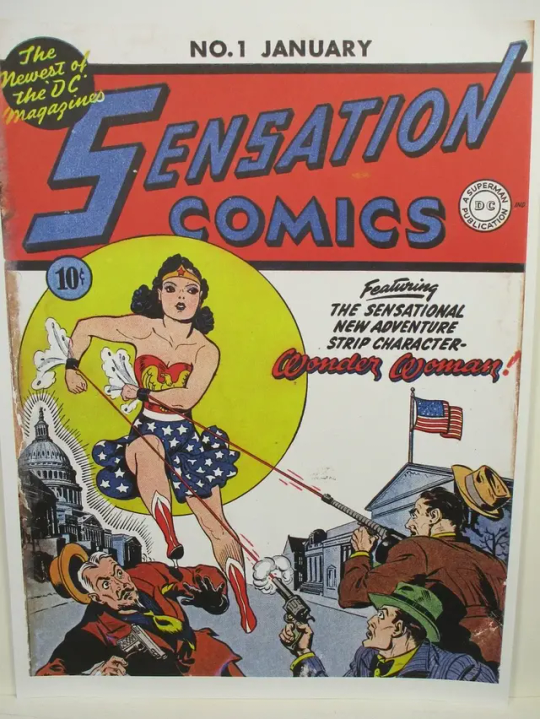
820 notes
·
View notes
Text
About Loid Forger's therapy in SxF manga chapter 77
(Spoilers ahead)
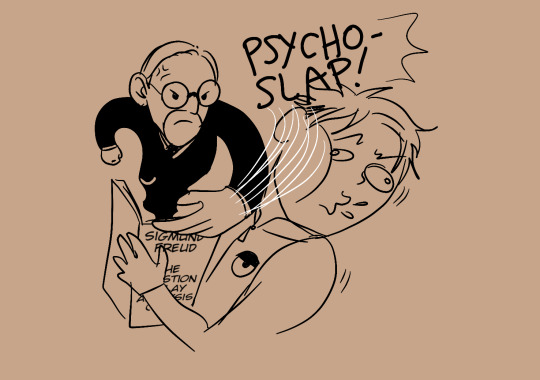
There's a Freudian text for everything. Today's all about The Question of Lay Analysis (1926), also known as Wild Analysis.
Endo did what I have been planning to do for a comic of my own: depict Loid actually working as a Psychiatrist. While I'm glad he took this path, sadly I can't say he did a good job on it.
As some of you know, I'm a therapist grounded in Psychoanalitic Theory. Yes, I like Freud and Lacan, and no, Oedipus Complex is not what you heard it is. I did a brief analysis of Psychiatry stuff in SxF in the past, and today I feel compelled to repeat that exercise.
Let's go in order.
1. The importance of being a third party

What's the reason for which people ask a therapist for help, and not their families or friends? What do we have that they don't?
The answer is pretty simple: neutrality. We don't have a side other than rationality and ethics. A good therapist should be able to listen to his patient without losing objectivity.
When you and your patient have a shared, unique shared experience, it's preferable, even ethical, to refer him to another therapist, in order to preserve the higher interest of the patient. The more neutrality you can muster, the better for the curing process. Otherwise, it's really hard to listen to someone else without being constantly reminded of yourself. It turns into a blind spot.
Now, there are exceptions to this rule, but you must handle them carefully, and always putting the patient at the center. Loid openly talking here about how close he is to the hijacking incident doesn't help much.
In short, you have to ensure that your position in the therapeutic process remains an impartial, neutral Other, and avoid becoming a fellow. It's good to create trust, but not too much, just enough to work.
2. Chronic condition (?)
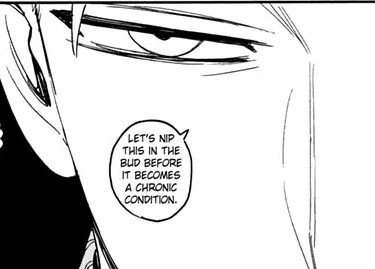
The biggest difference between a Psychiatrist and a Psychologist is that the first went to Med School. Hence, chronicity is a term that applies mostly for organic conditions, but it's rare in the field of subjectivity.
In my short experience, I've met cases labeled as "chronic depression" being cured. I, myself, cured a case of "compulsive suicide attempts since 15 years old, chronic depression, started hearing evil voices 2 weeks ago". You might think that I'm a great therapist, but it's not the case; it's just that, in order to tackle subjective problems, you ought to go to the root of the symptoms and deal with the subjectivity you find there. Psychoanalitic therapy has proven to be wonderful to treat many conditions that didn't get a cure in other types of psychotherapy.
Of course, it's not a panacea. There are things that we can't figure out yet. But bear in mind that chronicity, in the field of the mind, is more complex than just the passage of time and only a bunch of mental conditions truly admit it.
Jacques Lacan, the most important psychoanalist after Freud, said that the unconscious's track of time is not chronological, but logical. You don't just jump out of adolescence because you turned 18; other things need to happen for you to finally feel like an adult. It's a logical progression. The same can be said about some "chronic" conditions.
3. Explicit Reason of Consultation vs Latent Reason of Consultation
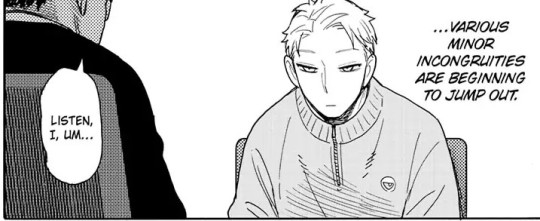
A.K.A Everybody lies.
Psychotherapy is a really weird thing to learn and master. In Psychology School they teach you that you must trust what your patient tells you, but at the same time, distrust him enough. How to conceal both things?
Well, everything is easier when you take Dr. House's words to heart.
Everyone states a reason for consultation, but that first reason is never the real reason, no matter how reasonable it might sound. The trick to discern what the latent, real reason for consultation is, is to determine what the subjective conflict hiding in plain sight is. Sometimes there isn't any and therefore, a full psychotherapy is not necessary (maybe just assisting someone with some things, being there just in case, etc), but most cases are built upon a conflict.
I'm glad that Loid here decided to act like a good Psychiatrist and took a mental note on the oddities.
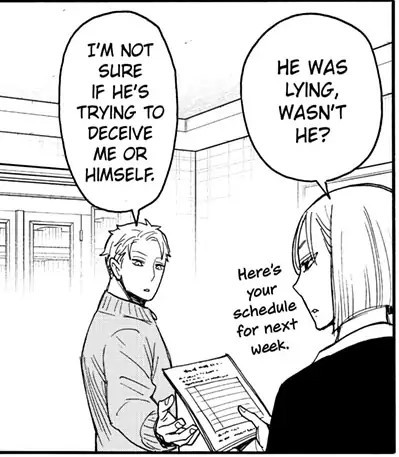
WELL SAID MY BOY, I'M PROUD OF YOU
I want to remark this, because it's discouraging how many therapists oversee this to simplify their job to an extreme. Believe it or not, there are therapists out there that act upon what their patients tell them first. "Hi doc. I came here today because I got an accident and I think I have PTSD". "Ok, I'll have you practice these mindfulness excercises and you should be ok within a month, see ya". DUDE.
4. The place of truth in the context of Psychotherapy
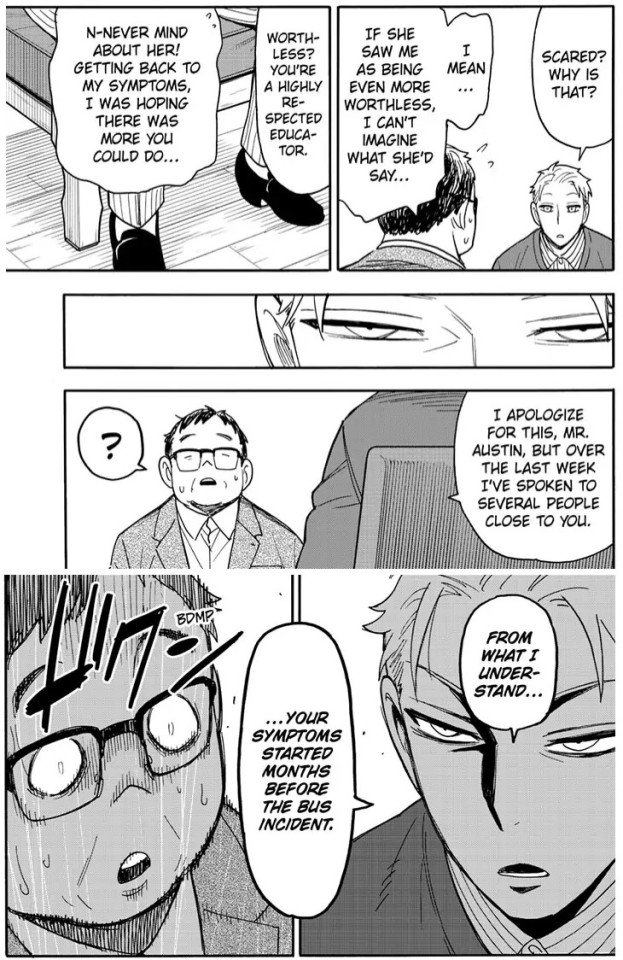
Ah, the classic temptation of knowing the 'real' truth. Is this patient in front of me bullshitting his way out? Is he in a delirium? Is she telling the truth, or just embellishing her story to make it more believable?
You don't have this struggle once you are certain of your role as a psychotherapist. And your role is to help your patients to deal with their subjective struggles.
In short: Psychoterapy deals with the patient's truth, not with the 'real' truth.
You know who deals with 'real' truth in the field of Mental Health? Social Workers.
We psychotherapists don't need to ascertain our patient's claims. Confronting them with reality usually proves to be fruitless, just like Loid did here ("But you're a respected educator!"). It's way more useful to open the topic by asking more questions such as "How did you reach that conclussion?" "What made you think that way?", or giving a specular answer ("You speak like someone else said that about you", "You're too hard with yourself. Where does that come from?", "It sounds like you're belittling your fear for what your wife could say", etc etc etc).
Whenever you're with a neurotic patient, their own personal truth is the only truth you need to work with. Leave the 'real' truth for people who actually needs it, like Social Workers, Doctors or Judges. Your role with a patient is to make sure that his personal truth can turn into something less painful. No need to talk with their friends and family for info, unless your patient is a child or a teenager; just ask him and stick to what he says word by word.
There's a huge topic about the place of reality in therapy, specially in the field of Psychoanalysis, but if I start this train of thought I'm afraid I'll go down to Hell. If you're interested, I've reblogged some Lacanian pills on this Tumblr, check them out by searching the tag #lacan.
PS: NO LOID, DON'T DO THAT. DON'T BREAK THE TRUST YOU ACHIEVED WITH MR AUSTIN! CONFIDENTIALITY IS A MUST!!
5. Counceling = Psychotherapy?

Loid is a (fake) Psychiatrist, not a psychotherapist, so I can't be too hard on him. Also I stan this man. I'm painfully well aware that councelling and coaching is an alternative to psychotherapy in other parts of the world, mostly in the US. But let's not forget one thing:
Psychotherapists DON'T GIVE ADVICES.
At least, not the ones that take this job seriously.
Everyone can give advices. Do you want an advice? Ask your family or friends, or post something in social media, or ask a complete stranger in the street what to do. You'll get plenty of answers and advices. Maybe a bunch of them will be really useful. Good!
The thing with advices is that:
-They act like a universal recipe for a problem
-There's no universal recipe to sort a problem
-They don't tackle the subjective root of a problem
-They assume that the problem can be solved by something you can do upon your surroundings, when the real struggle stems from subjective problems
Some advices do help with real struggles, but when you have a subjective conflict, they barely help; hell, sometimes they make everything worse.
Like Loid here.
Remember when I mentioned that the unconscious mind's track of time is not chronological, but logical? This is a great example. Mr Austin won't be able to properly talk with his wife just because Loid adviced him to; he must solve other issues before that.
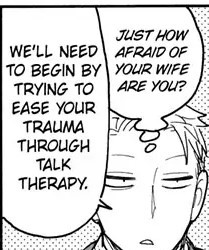
I'm glad we're on the same page on this one
6. Your therapist is not your friend
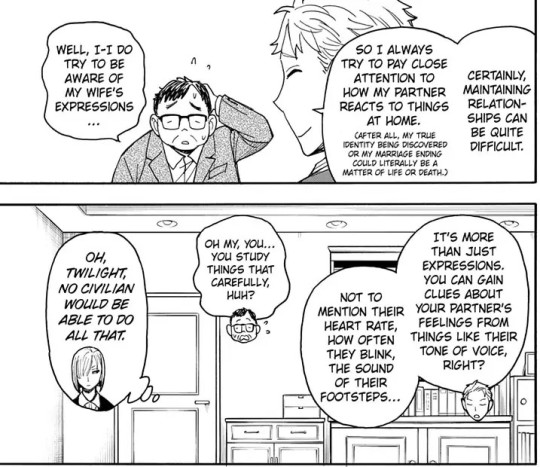
Sad but true.
If your therapist is good enough, you won't know many things about his private life. You won't know about his lover, his hobbies, where does he live, what does he fear.
Why the secretism? Because it's useless for the patient. Also because disclosing personal information has the effect of becoming a model for the patient, who would start to imitate you. And finally, because you need to mantain a semblance of neutrality and not getting emotionally close with the patient more than necessary.
PS: It's kinda cute how aware Loid is about Yor's every movement. Kinda. KISS HER ALREADY, GODDAMNIT
7. Talking cure and (how not to use) the divan
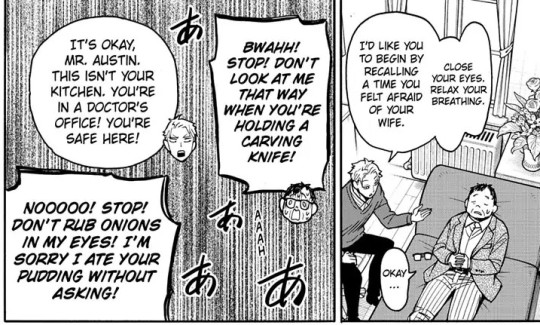
I talked a bit about divans here.
There, I mentioned that you should NEVER PUT A PSYCHOTIC PATIENT IN A DIVAN. NOPENOPENOPENOPENOPENOPE. Well, we can amplify this rule a bit and say that you should avoid the divan with any patient that has a risk of getting seriously upset, like in severe trauma.
The divan is not the only thing that could play against you if badly used. There are cases in Psychiatric Hospitals of patients getting upset because their therapists used the same clothes and hairstyle every single day for months. The point here is that, with psychotic patients and fragile psychic structures (like what happens in traumatized people), you can't use methods that require too much projection.
Also, Lottie here is not performing a Talking Cure.
The divan has been used since Freud to facilitate transference through the Free Association Method. You lay down on it and your therapist ask for whatever crosses your mind first. You don't put a content there beforehand.
(On the same line, if you're a therapist, please refrain from decorating your consultation room with motivational phrases. You're putting words in your patient's mouth before he even starts to speak)
So, it's useless to make Mr Austin lay down on a divan, only to ask him to remember a specific memory. I'd advice (Ha! The irony!) against using the divan here.
----------------------------------------------------------------------------
To finish my Two Cents, I'd like to point some positive aspects of this chapter.
It's nice that a troubled person decides to seek for help. There's still a huge stigma about men requiring mental health help, and it's a nice example to settle to portray one actually going to a Psychiatrist. Men usually struggle with their problems alone and they have it rough.
It's also nice that, in the end, Loid could help his patient. I wonder how (How?!), but it probably means that, at some point of the process, he changed his methods for the better.
And yes. Sometimes, helping one single person can change many lives. I'm honored to be able to attest to that :D
As everyone, I'd expect the logical sucession of events that could follow this chapter: Loid realizing he's got a heck of a wife compared to other marriages, appreciating Yor more, and giving us heavy smut cute TwiYor moments. But Endo has proven to be an author that doesn't like to follow logic. So, let's brace for whatever will come in two weeks.
Thank you for reading!
#spy x family#loid forger#psychiatry#psychoanalysis#sigmund freud#jacques lacan#psychotherapy#spy x family manga#sxf
391 notes
·
View notes
Text
TIGER HRT - MONTH -6 - THE CONSULTATION
The specialest of special thanks to @ayviedoesthings for creating the original Dragon HRT story, and a big shoutout as well to @kaylasartwork, @welldrawnfish, @nyxisart, and @deadeyedfae for their takes on the concept! Every one of you is inspirational, and your work gives me so much second-hand gender euphoria!
Next
---
"Miss Alexis, please come in."
I look around as I walk inside. Between the doctor being a balding middle-aged man and the office looking like any generic doctor's office, I'm honestly a little disappointed. I was hoping the infamous source of therian HRT would be a little more… I don't know. Exotic? Unique? I was half expecting the walls to have before and after photographs of clients, but I suppose when it comes down to it, this is a serious medical facility, not a beauty salon. I walk up to the desk and sit down in the chair.
"Now I understand you wish to be a… a tiger?"
I'm unable to suppress my euphoria at the idea, and I start grinning and nodding. "A white tiger! I haven't changed my fursona since I got one, it's about time I start embodying it!"
"Indeed… And I see on your medical history that you are transgender." He mutters under his breath, "Just like all the others…"
I give a little smirk. 'All the others' are the reason I'm here. If this guy is handing out meds that can turn people into dragons or fish or bats, then a tiger should be easy, right? It's a mammal, and not much bigger than a human, relatively speaking. I had even given some thought to the rumoured "Fifteen Minute Shortcut", but when it comes down to it, even if I did have the ungodly pain tolerance to withstand such a rapid transformation of my bone structure and musculature, I… don't really want to do it quickly. Mundane HRT has already been such an absolute gift in terms of euphoria from noticing the slow and gradual changes, I want to keep that up. I want to notice the little things.
"Now I'm afraid there are some requirements to be settled first…"
Oh boy. Here comes the bureaucratic bullshit. Everything that's been put in place to make sure Our Children don't Make A Terrible Mistake. When it comes down to it, bodily autonomy only counts when you're not one of the weirdos. The instant you decide to be capital-d Different, people start falling over themselves trying to talk you out of it.
"First of all, I see that you have been taking human hormone therapy for a little over six months. We do require a full year of human treatment before beginning therian treatments, and I'm afraid that is fully non-negotiable. There are matters of biology that require the body to be a certain degree of… receptive."
I was afraid of this, but at least it's not a deal-killer. Another half-year is bearable, even if I am going to be shaking with anticipation the entire time.
"I also see you have letters from a practicing physician and a social worker, but we do require a second psychologist to be involved in the process."
Okay. Absolute horseshit, but not impossible. All I've got to do is find another social worker or psychologist. And pay them for several months of sessions. And hope they don't decide I'm crazy for wanting to throw away my humanity. I can feel my expression souring…
"It's also required to live as your desired species for at least a year before beginning the process."
"What." I'm leaning forward and glaring at the doctor before I fully realize it. "And how exactly am I supposed to do that, without the… the requisite biology, or the inborn instincts, or the… the habitat!" I let out a frustrated growl. "Am I supposed to fly off to India or Bangladesh or somewhere, and start camping out in the wilderness??"
"Miss Alexis, please, I'm afraid these are… are the requirements set forth by the guidelines of -"
"Guidelines!" I slam a palm down on the desk between us, before letting out a frustrated breath. "Just that… Guidelines. You know, and I know, that a lot of people have come to you already, with a lot more… exotic requests. Flying animals? Aquatic animals? A fucking DRAGON??"
The doctor seems taken aback, maybe he didn't expect this level of resistance.
"What is even the natural habitat of a dragon anyway? Or the diet? Or the behaviours in the wild?? It's a mythical creature for gods' sakes, there's no firm evidence they even existed!!" I stare at him, unblinkingly, with what I dearly hope is a predatory glare. "But I do get it, though. You have to be absolutely sure I won't regret it. Liability, or whatever. …Maybe we just need to know how hard I can BITE."
Something changes in his expression. …Malice? No, not quite. A sort of… satisfaction, maybe.
It was a test. He wanted to know whether I'd just roll over and accept the impossibility of my quest, or whether I was prepared to fight for it.
Joke's on him, just getting human HRT was such a godsdamned hassle, I already know how to fight.
He adjusts his glasses. "Perhaps there is something I can do for you… Let me get you some forms."
34 notes
·
View notes
Text
Why laziness doesn't exist
There is probably not a person in the world who hasn't been told at least once, "You're just lazy". We hear about laziness from childhood - from parents, grandparents, and teachers ("A capable girl, but lazy. You should try harder!"). Later we ourselves begin to use this phrase and call ourselves, our partners and children lazy. But is it really that simple with this idea? Dahl's Dictionary tells us that laziness is "a reluctance to work, an aversion to work, to doing, to occupation; a tendency to idleness. Interestingly, laziness is seen here in two senses at once: as a deed or temporary condition when a person does not want to work, or as a permanent character trait - if a person is inclined to do nothing.
However, psychology treats laziness very differently: it believes that it is neither a feeling nor a quality of character, but a social construct. There are basic emotions - fear, sadness, anger, and joy - that are common to all higher mammals, and we feel them in approximately the same way. But there is no such feeling as laziness - there is a feeling of fatigue or a state of apathy, there is aggression, which can be expressed in the unwillingness to do something (the same "aversion to work"). The character trait "lazy" does not exist either - we use it to describe people who do not want to do something that we think they should. Even if we're talking about ourselves.
Where does laziness come from?
Usually laziness is first told to us by parents or teachers. A child may learn that they are "lazy" in different situations: for example, when they are not energetic enough in the opinion of the elders - that is, apathetic and lethargic. A healthy child should really be active, so lethargy is really a cause for concern. But in this case, it is better to consult a doctor or a psychologist, and not to label it. The second and, probably, most frequent variant is when a child is not interested in what his parents consider useful and necessary: "You are lazy to clean the room", "You are lazy to do homework", "You are lazy to visit grandparents. There can be a hundred different reasons for not wanting to do something, but since parents are considered the unquestionable authority, and our culture still does not talk to the child about his desires and feelings, any disobedience is usually blamed on either bad behavior (when the child actively rebels) or laziness (which is considered a passive rebellion). Growing up, we get used to this concept and begin to describe ourselves and other people through it.
Unfortunately, the idea of "laziness" prevents us from understanding our own feelings, motivations, and even our physical condition: sudden apathy, which we habitually dubbed laziness, when examined by a doctor can turn out to be the onset of bronchitis, a low hemoglobin level, or pregnancy. The notion of laziness can cause us to start pushing ourselves. Compare: the phrase "I'm resisting it" prompts further reflection, prompts us to figure out what's going on - what am I resisting, what's the reason? What is it that I don't like or don't like about it? And the words "I am lazy" imply a moralizing view. Laziness here is a "vice" that must be eradicated. "Laziness" is a convenient label for a whole bunch of tangled feelings, uncomfortable and unpleasant relationships, conflicts that keep us from being active
Psychologists or coaches are often approached with something like this request: "How do I start my tenth project when the previous nine have worn me out to the point of exhaustion?", "I sleep four hours, work twelve hours without days off, and there's no way I can start learning French. I'm lazy, aren't I?" Of course, laziness has nothing to do with it. No amount of self-motivation techniques will help a man who is weary. His problem is rather that he cannot stop thinking of himself as an omnipotent cyborg and recognize himself as a living person with a need for rest, doing nothing, and having fun. Usually in such cases one has to turn to childhood and family attitudes. It is not uncommon there to find ideas that vacations are "shameful," that they have to be "earned" or have good reasons for them (three years without a vacation, a serious illness). Or the attitude that only those who do good are loved. A great deal of usefulness. The person who wants to be loved and accepted begins to work himself to the bone, destroying himself and the close relationship - there is simply no resource left for them. When he feels that the relationship is collapsing, feels unwanted, he tries to work even harder against all odds. Mom and Dad demonstrated that they love hardworking people like that - then, this must be true for other people as well!
What is laziness hiding?
Very often "laziness" is a convenient label for a whole tangle of confusing feelings, uncomfortable and unpleasant relationships, and conflicts that prevent us from being active. For example, you are "lazy" to get a second higher education or to improve your skills. It's scary to think about: maybe you are "lazy" because you don't want to do something that seems pointless to you? For example, if you did not set the goal yourself - just someone important to you suggested to you that a second higher education is necessary.
If you don't have any energy to go to the courses or to sit at the desk after your main job and you are desperately truant, it's time to ask yourself the question: what was the purpose of all this? If you dream of a career change, maybe just applying for an internship would be enough? Or even just send a resume for a position at a slightly lower salary, writing in all the experience of working in similar occupations. You'd be surprised how much shorter the path to your goal is if you figure out what you really want.
Or maybe the initial goal was to please mom and dad? Then it is worth looking for a less energy-consuming way - and even work with a psychologist on where the demonstration of love and gratitude to parents ends and begins to live other people's life scenarios.
You should be careful if laziness covers you every time when you undertake a task (a meeting, a project, a trip) connected with a certain person or group of people. For example, at work, you put off tasks from a certain client to the last minute, although you always carry out the rest on time - you just can not bring yourself to start. Or you are lazy before a trip to some friends or relatives, although in other cases you endure a much longer trip. It even happens that over and over again you don't want to open a book or watch a movie recommended by someone.
In this case, it is worth remembering what has been happening in your relationship lately. Usually there are good reasons: laziness turns out to be a way to passively resist aggression, violation of boundaries, humiliation, violation of agreements. Indeed, it is "lazy" to meet with a friend who canceled two previous meetings when you were already on your way. And you don't want to do a project for a client, from whom you then have to demand a fee for months. "Too lazy" to go to relatives who criticize your lifestyle, who are rude, who violate boundaries. And you don't even want to read a book from a person who treats you badly - and it's not that you supposedly don't seek knowledge, but that difficult feelings about the person are transferred to reading, watching a movie, or traveling.
"You're just being lazy!"
The phrase "you're just lazy" is also an excellent means of manipulation. Essentially, the person is telling you, "I want you to do this. If you don't do it, I'll think you're bad, and I'll try to instill that same thought in you." The appropriate thing to talk about here is not the qualities of your character, but the activity that you are supposedly lazy to do.
Talking about an employee being lazy at work can be a "good" way to brush off all the uncomfortable issues, from salary delays to imbalances of power and responsibility. In this way, the employer may be trying to move the conversation away from the business relationship into categories of evaluation and morality, and that's wrong. You may be "lazy" to take on other people's responsibilities and overwork without extra pay. Or you are "too lazy" to do a project yourself that requires more formal authority and promotion. And here it's very helpful to call things by their proper names: "I'm sorry, I don't think it's acceptable to require me to stay until 9 p.m. on a Friday night without overtime pay," "In order to take on this project, I must have the authority to sign documents and your power of attorney."
When your partner says you are "just too lazy" to mop the floors and make dinner after a full day of work, instead of accusations and excuses, it's more appropriate to talk about how to share household chores. If you are "too lazy" to visit my mother at the cottage hundreds of miles from the city, it is worth thinking about what was going on in your relationship or if you are not tired. In any case, it is useful to think not about laziness, but about whether a working person is physically able to drive six hours through traffic on Saturday to the cottage to return home the same way on Sunday night to Monday, and how necessary it is to express love for parents in this form (this is a big question).
One of the most difficult issues is when there is conflict behind laziness. The worst is when what you do conflicts with your values - to exaggerate, it's very hard to be vegan and work at a meatpacking plant, or to advocate for body positivity and promote beauty pageants. In this case, laziness is literally salvation. It is a healthy resistance to what one considers immoral, harmful, or dishonest. And activities that go against your life principles are best changed as soon as possible because they are destructive.
The idea of laziness is like a trash can, where all kinds of unwanted and uncomfortable feelings are thrown out instead of being dealt with. So if you are suddenly overwhelmed by laziness and guilt about it, it's time to rummage in that garbage can, pull out your accumulated feelings and emotions, and examine them carefully.
written by psychologist Yana Shagova, published in Wonderzine, translated from russian using DeepL
#I've read this article years ago and it was so eye opening i regularly re read it#i want my english speaking friends to read it too#how do i tag this#long post#text#article#psychology#therapy#laziness
684 notes
·
View notes
Text
First job | batfamily x reader





— Remember I said I wanted to make money alone without needing it with Dad's help? - you enter the dining room, everyone was there, even Alfred who pulled the chair for you to sit. — And you know I can't say no.
— Did you get a job? - Bruce looked proudly, you wanted to try to win the world without needing Bruce to give a push.
— Yes, I saw an ad in the newspaper and I was all excited and sent a resume, I had no details about the vacancy, just an address and a cell phone number.
— Hey? - Jason looked curious.
— They called me and I went to the interview today.
— You look a little strange, what is it? - Damian looked worried.
— They gave me the place, it's more like an assistant, I even won a uniform that is purple... Pretty cool even.
— Great, we're proud of you.- Alfred says.
— In fact, I should have refused the vacancy.
— Why? - Tim asks.
— So... I went there and guess what, it was the wildcard I was hiring. - you smile sweetly, Bruce choked on the water, everyone looked shocked at you.— He wants a helper to kill Batman.
— ______! - Dick shouted, Damian and Jason laughing and Tim was in shock. — Batman is the father.
— Why didn't you deny it? - Jason asked.
— The salary is good, earned until transport and health aid... I don't work on holiday or on the weekend... He said that no one will dare hurt me... I saw advantages.- you say putting attention on dinner.
— But what about father ____? - Damian tries to be serious.
— Honey- Bruce starts.
— The deal is with Batman, Bruce is my father, he is nothing personal, so there is no problem.
— His view of 'no problem' is very strange.- Bruce says sighing. — Okay, it's his first job... Good luck I think.
— Batman be careful because Joker and his assistant will play the terror.- you scream excitedly following Alfred into the kitchen.
— Are you really going to let her work with the Joker? - Dick asks shocked.
— Of course not, call the psychologist at _____, she needs an urgent consultation.- Bruce says he'll eat again.
#reader insert#x reader#incorrect quotes#dc x y/n#jason todd x reader#anime x reader#dcu#dick grayson#bruce wayne x fem!reader#damian wayne#batman x y/n#batfam x reader#dc x reader#bruce wayne#batfan#batman#jason x reader#dick x reader#dick grayson x reader#damian x reader#batman x joker
398 notes
·
View notes
Text
people arguing against self-dx because “you need to go to a PROFESSIONAL only they can tell you if you have a mental disorder, you must consult someone who knows what they’re talking about!” is sooooo so funny to me as someone whose mom is literally a psychologist. when I was 15 I told her I was certain I had bipolar and she told me it’s not bipolar I actually have pms and I only have mood problems when I’m on my period (entirely incorrect also I was pro dx with bipolar several years later. also she and her entire family and my brother have bipolar so it should have been no surprise?). I once overheard her talking on the phone with my grandpa who has npd that he can’t have that disorder because he “doesn’t hurt people” (that’s a whole other can of worms but also wtf). when my brother talked to my parents about me and him probably having npd she tried to argue that “well those traits are common in gifted kids”. she’s an award winning psych with a phd. you SHOULDNT blindly trust what professionals say. they do NOT know everything, they hold personal biases and outdated beliefs about mental illnesses, they do NOT know you better than you know yourself, and they are NOT experts on every single aspect of mental illness. stop putting mental health professionals on pedestals they aren’t as all knowing and competent as you think they are and there’s a reason so many people don’t have pro dx’s, even ignoring the problem of money.
47 notes
·
View notes
Text
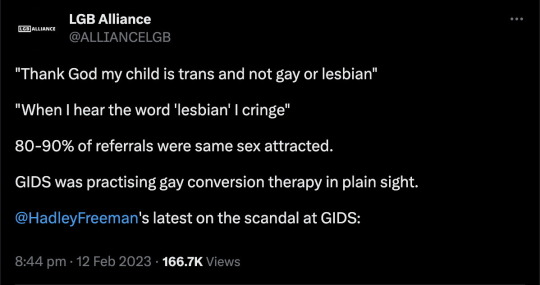
By: Hadley Freeman
Date: Feb 11, 2023
It wasn’t easy for Hannah Barnes to get her book published. As the investigations producer for Newsnight and a long-term analytical and documentary journalist, she is used to covering knotty stories and this particular one, she knew better than most, was complex. She had been covering the Gender Identity Development Service (Gids), based at the Tavistock and Portman NHS Foundation Trust in north London — the only one of its kind for children in England and Wales — since 2019 and decided to write a book about it. “I wanted to write a definitive record of what happened because there needs to be one,” she tells me. Not everyone agreed. “None of the big publishing houses would take it,” she says. “Interestingly, there were no negative responses to the proposal. They just said, ‘We couldn’t get it past our junior members of staff.’ ”
Whatever their objections were, they could not have been about the quality of Barnes’s book — Time to Think: The Inside Story of the Collapse of the Tavistock’s Gender Service for Children is a deeply reported, scrupulously non-judgmental account of the collapse of the NHS service, based on hundreds of hours of interviews with former clinicians and patients. It is also a jaw-dropping insight into failure: failure of leadership, of child safeguarding and of the NHS. When describing the scale of potential medical failings, the clinicians make comparisons with the doping of East German athletes in the 1960s and 1970s and the Mid Staffs scandal of the 2000s, in which up to 1,200 patients died due to poor care. Other insiders discuss it in reference to the Rochdale child abuse scandal, in which people’s inaction led to so many children being so grievously let down.
Gids treats children and young people who express confusion — or dysphoria — about their gender identity, meaning they don’t believe their biological sex reflects who they are. Since the service was nationally commissioned by the NHS in 2009 it has treated thousands of children, helping many of them to gain access to gonadotropin-releasing hormone agonists, known as “puberty blockers”, originally formulated to treat prostate cancer and to castrate male sex offenders, and also used to treat endometriosis and fertility issues. The service will shut this spring, following a deeply critical interim report in February 2022 by Dr Hilary Cass, a highly respected paediatrician who was hired by NHS England to look into the service. Dr Cass concluded that “a fundamentally different service model is needed”.
Gids should be an easy story to tell: many people have been trying to blow the whistle for a long time, but Anna Hutchinson, a clinical psychologist who used to work at the Tavistock Centre, told Barnes that those who spoke up were “always driven out one way or another”.
“It is really not normal for mental health professionals to talk to journalists as openly as they talked to me, and that shows how desperate they were to get the story out,” Barnes says. The clinicians struggled to be heard, just as Barnes later struggled to get her book out; some people prefer censorship to the truth if the latter conflicts with their ideology. And yet, concerns about the service had been in plain sight for years: in February 2019, a 54-page report compiled by Dr David Bell, then a consultant psychiatrist at the trust and the staff governor, was leaked to The Sunday Times. Dr Bell said Gids was providing “woefully inadequate” care to its patients and that its own staff had “ethical concerns” about some of the service’s practices, such as giving “highly disturbed and distressed” children access to puberty blockers. Gids, he concluded, “is not fit for purpose”. Many of Bell’s concerns had been expressed 13 years earlier in a 2006 report on Gids completed by Dr David Taylor — then the trust’s medical director — who described the long-term effects of puberty blockers as “untested and unresearched”.
“Taylor’s recommendations were largely ignored,” Barnes writes, and, in the decade and a half between Taylor and Bell’s reports, Gids would refer more than 1,000 children for puberty blockers, some as young as nine years old. It’s impossible to obtain a precise figure because neither the service nor the endocrinologists who prescribe the blockers could or would provide them to people who have asked for them, including Barnes. One figure they have given is that between 2014 and 2018, 302 children aged 14 or under were referred for blockers. It is generally accepted now that puberty blockers affect bone density, and potentially cognitive and sexual development. “Everything was there — everything. But the lessons were never learnt,” Barnes says.
Because this story touches on gender identity — one of the most sensitive subjects of our era — it has been difficult to get past the ideological battles to see the truth. Was the service helping children become their true selves, as its defenders contended? Or was it pathologising and medicalising unhappy kids and teenagers, as others alleged?
This reflects the fraught, partisan ways people see gender dysphoria: is it akin to being gay and therefore something to be celebrated?; or is it an expression of self-loathing, like an eating disorder, requiring therapeutic intervention? This has led to the current confusion over whether the planned conversion therapy ban should include gender as well as sexuality. “Conversion therapy” obviously sounds terrible, and politicians across the spectrum — from Crispin Blunt on the right to Nadia Whittome on the left — have loudly voiced their support for the inclusion of gender on the bill, which would thereby suggest that therapy for gender dysphoria is analogous to trying to “cure” someone of homosexuality.
But many clinicians argue that including gender would potentially criminalise psychotherapists exploring with their patients the reason for their confusion; after all, a doctor wouldn’t simply validate a bulimic’s desire to be thin — they’d try to find the cause of their inner discomfort and help them learn to love their body. Gids itself has long been conflicted about this complex issue. Dr Taylor wrote in 2005 that staff didn’t agree among themselves about what they were seeing in their patients: “were they treating children distressed because they were trans,” Barnes writes in Time to Think, “or children who identified as trans because they were distressed?”
How did the country’s only NHS clinic for gender dysphoric children not even understand what they were doing, and yet keep doing it? Thanks to Barnes and her book, we now know the answers to those questions, and many more.
Gids was founded in 1989 by Domenico Di Ceglie, an Italian child psychiatrist. His aim was to create a place where young people could talk about their gender identity with “non-judgmental acceptance”. Puberty blockers were available for 16-years-olds who wanted to “pause time” before committing themselves — or not — to gender-changing surgery. (Gids never offered that surgery, which is illegal in England for those under the age of 17, but it did refer patients to the endocrinology clinic, which provided the blockers. Blockers stop the body going through puberty, thereby making it easier — in some ways — for a person later to undergo the surgery.) In 1994 the service became part of the Tavistock and Portman NHS Trust, which was known for its focus on talking therapies. By the early 2000s those working within Gids noted that certain gender activist groups — such as Mermaids, which supports “gender-diverse” kids and their families — were exerting an “astonishing” amount of influence on Gids, especially in regard to encouraging the prescribing of puberty blockers. Barnes writes in her book that Sue Evans, a nurse who worked at Gids at the time, asked a senior manager why Gids couldn’t just focus on talking therapy and not give out body-altering drugs. According to her and another clinician, Barnes writes, the senior manager replied, “It’s because we have this treatment here that people come.”
In around the year 2000, the trust asked Di Ceglie to draw up a report of who its patients were. The results were astonishing. Most of Gids’s patients were boys with an average age of 11. More than 25 per cent of them had spent time in care, 38 per cent came from families with mental health problems and 42 per cent had lost at least one parent, either through separation or death. Most had histories of other problems such as anxiety and physical abuse; almost a quarter had a history of self-harm. No conclusions were drawn and Gids continued to treat gender dysphoria as a cause, rather than a symptom, of adolescent distress.
It was a gender identity clinic in the Netherlands in the late Nineties that came up with the idea of giving blockers to children under 16, and in doing so furnished Gids with the justification it needed. The Dutch clinic said that 12-year-olds could be put on blockers if they had suffered from long-term gender dysphoria, were psychologically stable and in a supportive environment. This was known as the “Dutch protocol”. Pressure groups and some gender specialists encouraged the clinic to follow suit.
Dr Polly Carmichael took over as Gids’s director in 2009 and, in 2011, the service undertook an “early intervention study” to look at the effect of blockers on under-16s, because so little was known about their impact on children. Instead of waiting for the study results, Gids eliminated all age limits on blockers in 2014, letting kids as young as nine access them. At the same time referrals were rocketing, meaning clinicians had less time to assess patients before helping them access blockers. In 2009 Gids had 97 referrals. By 2020 there were 2,500, with a further 4,600 on the waiting list, and clinicians were desperately overstretched. “As the numbers seeking Gids’s help exploded around 2015, there was increased pressure to get through them. In some cases that meant shorter, less thorough assessments. Some clinicians have said there was pressure on them to refer children for blockers because it would free up space to see more children on the waiting list,” Barnes says.
Clinicians were seeing increasingly mentally unwell kids, including those who didn’t just identify as a different gender but as a different nationality and race: “Usually east Asian, Japanese, Korean, that sort of thing,” Dr Matt Bristow, a former Gids clinician, tells Barnes. But this was seen by Gids as irrelevant to their gender identity issues. Past histories of sexual abuse were also ignored: “[A natal girl] who’s being abused by a male, I think a question to ask is whether there’s some relationship between identifying as male and feeling safe,” Bristow says. But, clinicians point out, any concerns raised with their superiors always got the same response: that the kids should be put on the blockers unless they specifically said they didn’t want them. And few kids said that. As one clinician told Barnes: “If a young person is distressed and the only thing that’s offered to them is puberty blockers, they’ll take it, because who would go away with nothing?”
Then there was the number of autistic and same-sex-attracted kids attending the clinic, saying that they were transgender. Less than 2 per cent of children in the UK are thought to have an autism spectrum disorder; at Gids, however, more than a third of their referrals had moderate to severe autistic traits. “Some staff feared they could be unnecessarily medicating autistic children,” Barnes writes.
There were similar fears about gay children. Clinicians recall multiple instances of young people who had suffered homophobic bullying at school or at home, and then identified as trans. According to the clinician Anastassis Spiliadis, “so many times” a family would say, “Thank God my child is trans and not gay or lesbian.” Girls said, “When I hear the word ‘lesbian’ I cringe,” and boys talked to doctors about their disgust at being attracted to other boys. When Gids asked adolescents referred to the service in 2012 about their sexuality, more than 90 per cent of females and 80 per cent of males said they were same-sex attracted or bisexual. Bristow came to believe that Gids was performing “conversion therapy for gay kids” and there was a bleak joke on the team that there would be “no gay people left at the rate Gids was going”. When gay clinicians such as Bristow voiced their concerns to those in charge, they say it was implied that they were not objective because they were gay and therefore “too close” to the work. (Gids does not accept this claim.)
What if becoming trans is — for some people — a way of converting out of being gay? If a boy is attracted to other boys but feels shame about it, then a potential way around that is for him to identify as a girl and therefore insist he’s heterosexual. This possibility complicates the government’s plan — which has cross-party support — for including gender alongside sexuality in the bill to ban conversion therapy, if enabling a young person to change gender is, in itself, sometimes a form of conversion therapy.
I ask Barnes what she thinks and she answers with characteristic caution: “It’s a bit surprising that the NHS has commissioned one of the most experienced paediatricians in the country to undertake what appears to be an incredibly thorough review of this whole area of care, and not wait until she makes those final recommendations before legislating,” she says, weighing every word. (Dr Hilary Cass’s final review is due later this year.)
The sex ratio was also changing to a remarkable degree. When Di Ceglie started his gender clinic, the vast majority of his patients were boys with an average age of 11, and many had suffered from gender distress for years. By 2019-20, girls outnumbered boys at Gids by six to one in some age groups, especially between the ages of 12 to 14, and most hadn’t suffered from gender dysphoria until after the onset of puberty.
Some said this was simply because teenage girls felt more free to be open about their dysphoria. Some clinicians suspected there were other reasons. The clinicians Anna Hutchinson and Melissa Midgen worked at Gids and, after they left, wrotea joint article in 2020 citing a number of potential other factors: the increased “pinkification” and later “pornification” of girlhood; fear of sex and sexuality; social media; collapsing mental health services for adolescents, and so on. “It is important to acknowledge that girls and young women have long recruited their bodies as ways of expressing misery and self-hatred,” Hutchinson and Midgen wrote. And yet Gids’s response was to send these girls to endocrinology for puberty blockers.
The clinicians knew their patients were nothing like those in the Dutch protocol. The latter had been heavily screened, suffered from gender dysphoria since childhood and were psychologically stable with no other mental health issues. “Gids — according to almost every clinician I have spoken to — was referring people under 16 for puberty blockers who did not meet those conditions,” Barnes writes. The majority of children aged 11 to 15 referred to the clinic between 2010 and 2013 were put on blockers. The clinicians tried to reassure themselves by saying the blockers were just giving their patients time to think about what they wanted. They might even alleviate their distress. But in 2016 Gids’s research team presented the initial findings from its early intervention study, which looked at the effect of prescribing blockers to those under 16: although the children said they were “highly satisfied” with their treatment, their mental health and gender-related distress had stayed the same or worsened. And every single one of them had gone on to cross-sex hormones — synthetic testosterone for those born female, oestrogen for natal males. Far from giving them time to think, blockers seemed to put them on a pathway towards surgery. Clinicians were concerned that the service had abandoned NHS best practice. They repeatedly raised this with Carmichael and the executive team, but nothing changed. In just six months in 2018, 11 people who worked at Gids left due to ethical concerns. People who spoke up, such as David Bell and Sonia Appleby, the children’s safeguarding lead for the Tavistock trust, say they were bullied or dismissed. Appleby later won an employment tribunal case against the trust. Bell has said the trust threatened him with disciplinary action in connection with his activities as a whistleblower. He later retired.
Everything the whistleblowers tried to say has been borne out. A 2020 Care Quality Commission inspection of Gids rated the service “inadequate”, and pointed out that some assessments for puberty blockers consisted of only “two or three sessions” and that some staff “felt unable to raise concerns without fear of retribution”. Around the same time, the former Gids patient Keira Bell instigated a judicial review against the trust, arguing that at 16 she had been too young to understand the repercussions of being put on blockers, and that she bitterly regretted her transition. The High Court found in her favour that children are unable to give informed consent to puberty blockers. The Court of Appeal later overturned their verdict on the grounds that it should be up to doctors and not the court to determine competence to consent, but the damage was done: thanks to Bell’s case, it was now public knowledge how shambolic the service had become, unable to provide any data on, for example, how many children with autism they had put on blockers.
So what actually happened at Gids? And why did no one stop it? Barnes’s book suggests multiple credible factors. Activist groups from outside, such as Mermaids and Gendered Intelligence, came to exert undue influence on the service and would complain if they felt things weren’t being done their way. For example, Gendered Intelligence complained to Carmichael, the Gids director, when a clinician dared to express the view publicly that not all children with gender dysphoria would grow up to be transgender. In 2016 an expert in gender reassignment surgery warned Gids that putting young boys on puberty blockers made it more difficult for them to undergo surgery as adults, because their penis hadn’t developed enough for surgeons to construct female genitalia. Instead, surgeons had to use “segments of the bowel” to create a “neo-vagina”. But senior managers rejected calls from its clinicians to put this on a leaflet for patients and families. In the book, Hutchinson is quoted as saying, “I may be wrong, but I think Polly [Carmichael] was afraid of writing things down in case they got into Mermaids’s hands.”
Susie Green was at this point the chief executive of Mermaids and had taken her son, who had been on puberty blockers, to Thailand for gender reassignment surgery on his 16th birthday. In an interview, which is still on YouTube, Green laughingly recalls the difficulties surgeons had in constructing a vagina out of her child’s prepubescent penis. Green stepped down from Mermaids last year.
Money is suspected to have been another issue. When Gids became part of the Tavistock trust, it was such a minor player it wasn’t even in the main building. But by 2020-21, gender services accounted for about a quarter of the trust’s income. David Bell says this allowed the trust to be “blinkered”. The children and adolescent mental health services (CAMHS) possibly had similar blinkers. They were so overstretched it appears they were happy to offload as many kids as possible onto Gids, and then disregard what was actually happening there.
“It’s really striking how few people were willing to question Gids. As one clinician said to me, because it was dealing with gender, there was this ‘cloak of mystery’ around it. There was a sense of ‘Oh, it’s about gender, so we can’t ask the same questions that we would of any other part of the NHS. Such as: is it safe? Where’s the evidence? Where’s the data? And are we listening to people raising concerns?’ These are basic questions that are vital to providing the best care,” Barnes says.
And then there was the outside culture. Basic safeguarding failures at Gids seem to have accelerated from 2014 onwards, at the same time that there was a push for the rights of transgender people. Stonewall, having helped to secure equal marriage, had now turned its sights on the rights of trans people. Susie Green, at Mermaids, gave a TED talk that suggested taking her teenage son for a sex change operation was a parenting template to admire. Meanwhile, the TV networks weighed in. In 2014 CBBC aired a documentary, I Am Leo, about a 13-year-old female on puberty blockers who identifies as a boy — mainly, it seems, because of an abhorrence of dresses and long hair. In 2018 ITV showed the three-part drama Butterfly, about an 11-year-old boy whose desire to be a girl is expressed as a desire to wear dresses and make-up. Susie Green was the lead consultant on the show.
David Bell suggests that the Tavistock trust protected Gids “because they saw it as a way of showing that we weren’t crusty old conservatives; that we were up with the game and cutting-edge”. That the Tavistock clinic was briefly, in the 1930s, a place where homosexual men were brought to be “cured” probably also played a part in the trust’s embrace of gender ideology, as if it were an atonement for a past wrong.
As per Dr Cass’s suggestions, Gids will shut this spring and be replaced with regional hubs, where young people will be seen by doctors with multiple specialties. The obsession with gender, and the ensuing lack of intellectual curiosity at Gids about factors that might contribute to a person’s distress and sense of their identity will, hopefully, be gone.
On the one hand, it feels incredible that such a disaster happened. How did an NHS service medicalise so many autistic and same-sex-attracted young people, unhappy teenage girls and children who simply felt uncomfortable with masculine or feminine templates, with so little knowledge of the causes of their distress or the effects of the medicine? And how did Carmichael, still the director of Gids, suffer no repercussions, whereas those who tried to blow the whistle say they were bullied out of their jobs? On the other hand, it is a miracle that the information is now out. For too long, too many people have turned a blind eye to problems arising from gender ideology, including healthcare for gender dysphoric children — because they have been focused on trying to be on the right side of history, they refused to look at the glaring wrongs.
Barnes knows that some will be angry at her for having written the book. But she also knows that she had to write it: “There’s been this idea that the kind of treatment young people got at Gids — physical interventions — is safe treatment for all gender-distressed children,” she says. “But even among the clinicians working on the front line of this issue, there is no consensus about the best way to care for these kids. There needs to be debate about this, and it needs to come out of the clinic and into society, because this isn’t just about trans people — it’s bigger than that. It’s about children.”
[ Via: https://archive.is/Fv41w ]
==
Modern-day Lysenkoism.
#LGB Alliance#Hadley Freeman#Hannah Barnes#Tavistock#GIDS#genderwang#gender ideology#queer theory#ideological capture#ideological corruption#medical scandal#medical malpractice#medical transition#medical corruption#gay conversion therapy#gay conversion#gender dysphoria#dysphoria#puberty#puberty blockers#hormone blockers#homophobia#anti gay#woke activism#wokeness as religion#cult of woke#woke#wokeism#trans the gay away#trans away the gay
73 notes
·
View notes
Text
Yet more hospital staff!
Actually, I think I'm done making side characters now. I'm extremely happy with how all of them turned out, and as usually happens with me, I'm sure a few of them will be promoted from supporting cast to something a bit more important.
Anyway...


Dr. Lauren Scully, endocrinologist - She puts up with being called "Agent Scully" (but only from people she likes). She's a diabetes specialist.


Gabriel Duke, Ph.D., paediatric psychologist - He's most noted for being fluent in sign language and having an older brother who's a famous athlete.


Dr. Daniel (Dae-Won) Kim, gastroenterologist - He looks like he can't take a joke, but he's actually quite funny once people get to know him. He's most known for aging well, and for his "mail-order husband". in actuality, Daniel met his (much younger!) husband on an online dating platform. Their engagement was very short, and they eloped, after which they had a lengthy long-distance relationship while Seung-Ri finished his residency. After that, Seung-Ri joined Daniel in Willow Creek and came to work at the hospital.

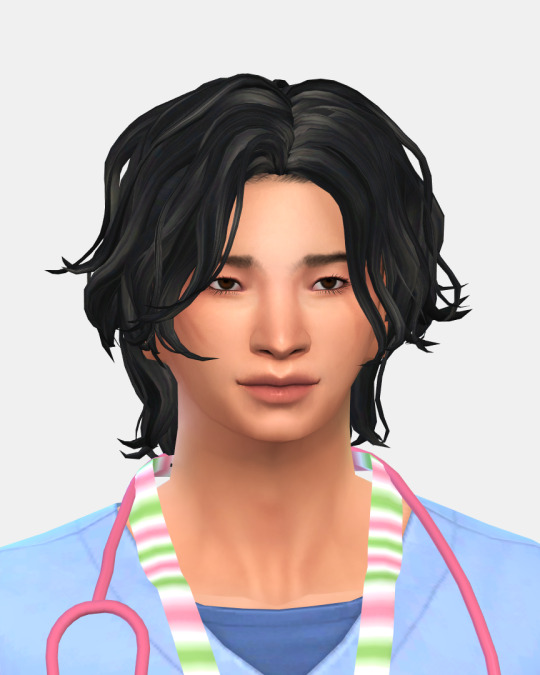
Dr. Seung-Ri Park, paediatrician - Seung-Ri sometimes goes by his English name, Henry, but actually prefers his Korean name. He is best known for his May-September relationship with fellow physician Daniel Kim, and for constantly being asked by patients' families, "Are you sure you're old enough to be a doctor?" He loves being Daniel's "trophy husband" and getting mistaken for a K-pop idol everywhere they go. Seung-Ri loves kids and is trying to convince Daniel they should adopt one.


Sunday Adebayo, registered dietitian and nutrition consultant - Sunday and his team work directly with patients across various departments. Their job is to help patients develop food plans that align with their treatments, and to help them maintain good health following their diagnosis. Sunday also works with patients who have eating disorders and who are chronically ill. He's most noted for being the hospital's most talented singer, and he can often be heard singing in the corridors.
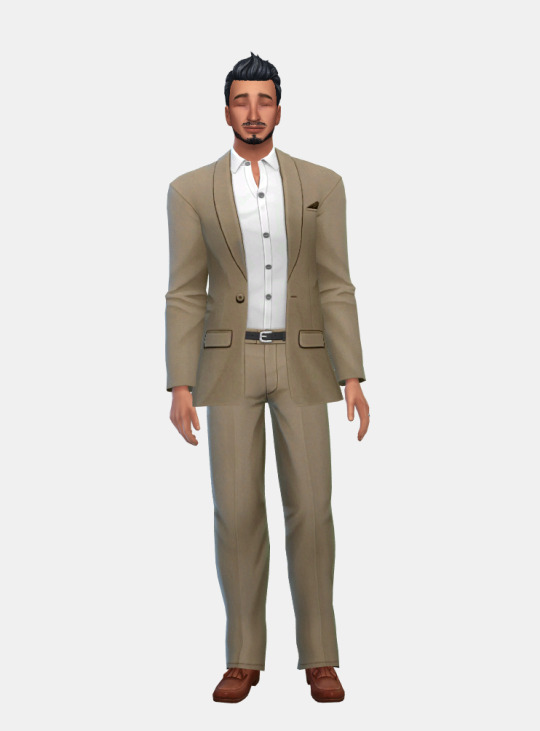
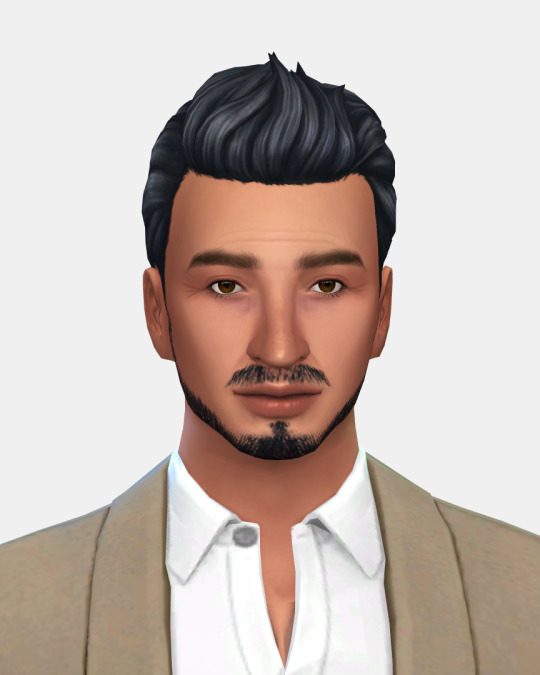
Ali Ibrahim, chief in-house legal counsel - As the hospital's primary lawyer, Ali's job is to advise administrators and staff on various legal and ethics issues related to service delivery and patient care. Ali and his small in-house legal team also represent the hospital in the event any member of staff (or the hospital itself) is involved in any sort of legal proceeding. He is the husband of paediatric nursing supervisor Laila Alhadi.


Ivy Clarke, Manager of Patient Experience - Ivy is essentially the hospital's PR lady. She and her team field complaints from patients and their families, and do their best to settle any issues before they find their way to Ali's office. Ivy is also the hospital's spokesperson, delivering official statements any time one may be required by the media. She's best known for being the plant lady; her office looks a bit like a jungle.
#made by sapphire#CAS#ts4#sims 4#eagames#Gabriel Duke#Lauren Scully#Ali Ibrahim#Seung-Ri Park#Daniel Kim#Sunday Adebayo#willow creek regional hospital#stargazersims
23 notes
·
View notes
Text
Courtiers and MС who has psychological problems.
Valdemar
Do not expect too stormy support from them. The maximum they can do in this case is to invite you to their examination in order to better study this phenomenon and check your reaction to different things.
They will express their condolences in words, but you will not catch a drop of emotion in them – for Valdemar this is nothing more than a diagnosis, and they are not a psychologist to conduct conversations with you.
Valdemar likes it when receptions go smoothly. With your permission, they give you various kinds of herbs and decoctions as an experiment to see your reaction.
Some of these potions really work and Valdemar often gives you a small dose, recording your observations.
Despite the lack of emotional support, it becomes easier for you.
– Valdemar, how can your psyche remain so strong? Isn't anything bothering you?
– I am not a human being, unlike you, so problems of this kind are alien to me, MC.
In the end, you get an effective prescription sedative, selected specifically for your body after a series of consultations.
Vulgora
Looking at them, it is impossible to guess that there is at least a pinch of compassion in them.
Looking at them, you are not sure that such things are worth sharing with Vulgora, but eventually they will find out everything on their own.
You expect the worst, such as rude taunts, but the Pontifex just sighs and surprisingly calmly tells you what you should have told earlier.
Vulgora is far from an expert in the field of psychological assistance, but this does not prevent them from trying to support you when it is especially difficult.
Always remind you that you are not alone. No, don't expect a bunch of warm words from them. Their help is very peculiar: Vulgora will roughly pat you on the shoulder, saying: "Well, what the hell are you crying for? Pick up the snot, we will overcome it! "
Surprisingly, it works. The pontifex doesn't need to say too much to give you hope again.
To improve your condition, if you wish, they take you with them to training and hunting, where you quickly relax, because Vulgarities will not let you feel sad.
Volta
She innocently bats her eyes and asks quietly: "Is MC sick?". That's when you have to explain to her what this thing is.
"Volta is insanely sorry that you feel this way, how can Volta help you?"
She becomes more agitated and sensitive around you, sometimes shows excessive care and tries her best to entertain during difficult periods.
Volta can be too sentimental and then she hugs you tightly, not wanting to let go for a long time.
But when the hard periods are over, she will never remind you of them, so that you feel good.
Soon you will recognize that it is easier to go through difficult periods with her. Volta is always there and helps you overcome it.
Valerius
Yes, in most cases this person behaves just disgusting, but if you are in a close relationship, he seeks to learn absolutely everything about you: the best and the worst.
One day Valerius approached you with a question that you least expected: "Are you sick?"
When you didn't know what to say to that, the consul, not expecting a clear answer, timidly hugged you. This happened for the first time during your friendship.
Since then, he has promised to be there. Valerius has spared no money to hire you a quality psychologist and pay for a session for several months.
The consul reacted negatively to your awkward refusals and soon convinced you that this was the first necessity for you.
Every time Valerius never tired of asking how the progress was progressing. It's very important to him.
If necessary, he does not spare funds for prescribed medications.
His eyes sparkle when he sees that you are getting better thanks to his help and he does not require anything in return.
Vlastomil
Honestly, he's trying. Can't worms calm you down?
When he realizes that the worms are powerless here, he tries to deal with the problem in more in detail.
Having a rather weak empathy, Vlastomil shifts from one foot to the other and tells you: "This is terrible, MC, I would so like to help..."
As a result, he is looking for his own ways to help you. No, it's not worms. And not even red beetles. On the territory of his estate there is a lush blooming garden, where he often takes you for a walk. He doesn't like butterflies, but he admires them for you.
Never loses patience, even when you are in the deepest depression and do not react to anything. Vlastomil is sitting next to you and trying to take care of you in every possible way, like a parent taking care of a child.
Regularly talks to you about your well-being, asks a lot of questions. You should not be annoyed if they are too personal, because in this way Vlastomil wants to get to know you better and provide more effective support.
Frequent heart-to-heart conversations and tea parties. With Wiggler.
#the arcana#the arcane game#nix hyrda#the arcana courtiers#quaestor valdemar#valdemar#pontifex vulgora#valdemar quaestor#the arcana vulgora#vulgora#praetor vlastomil#vlastomil#consul valerius#valerius headcanons#valerius the arcana#praetor vlastomil headcanons#valdemar headcanons#quaestor valdemar the arcana game#quaestor valdemar headcanons#vulgora the arcana#pontifex vulgora headcanons#vulgora headcanons#procurator volta#volta#procurator volta the arcana#volta headcanons#procurator volta headcanons#the arcana headcanons#the arcana courtiers headcanon#the arcana courtiers headcanons
98 notes
·
View notes
Text
On November 1st, I was feeling very bad, but now I'm calmer to share what happened. Recently, I went through another heavy bout of depression. Suicidal thoughts and even attempts, along with a lot of sadness, despair, and so on.
One thing that doesn't make sense is that everything in my life was fine. My only trigger had been a comment from my own son that left me extremely dysphoric. So, I continued my therapy at Casulo (the transgender outpatient clinic in my city) as usual, being honest and open with the professionals there during this delicate time, which coincided with the rib injury I suffered from wearing a binder. Even though I was depressed, I stayed strong in therapy, attending regularly, following the psychiatrist's recommendations to bring my partner for dialogue, and I even started a campaign to raise funds for my surgery. This gave me a boost, and I managed to climb out of the pit, even though my psychiatrist increased my medication dosage.
With the donated money, I was even able to have my first private consultation with the mastologist. As I mentioned before, I had given up on the public health system (SUS) after they lost my medical records from UREDIPE (the former outpatient clinic), and I spent ANOTHER YEAR at Casulo with the count of time RESET.
However, my hopes of getting surgery through SUS were revived last week when, during a consultation with the endocrinologist at the Casulo project, he started the referral process for me to go to Jean Bittar.
I filled out an anamnesis and did the same with the psychologist. When I asked the endocrinologist if he thought I could still have my surgery this year, he said it was VERY LIKELY. He added that on the 1st of the month, I should go to an appointment with the psychiatrist to obtain the last necessary assessment, and then it would be with the social services (to be referred to Jean Bittar). Obviously, I was SUPER HAPPY, thinking that I was going to get my surgery through SUS!!!
I don't know if you can understand how delicate it is to give someone with a dream hope. Especially a dream that directly relates to my mental health, given that the need for this surgery causes me to have very low lows, to become extremely depressed, and to desire to give up on my life!!! These were the hopes that were given to me.
I was so confident that I would have the surgery through SUS that, perhaps those who follow me have noticed, I reduced the promotion of my campaign.
On the 1st, however, when I went to the Casulo project (I had a routine appointment with a psychologist, and theoretically, I was ONLY going to do an anamnesis with the psychiatrist to get my assessment), everything went wrong.
Basically, the argument I heard was that the psychology and psychiatry team understood that I "had just come out of a crisis" and therefore I "needed to get better a little more" before being referred to Jean Bittar (the hospital that performs mastectomies).
You see, as I said, the reason for my crisis was a trigger that made me feel dysphoric. It was dysphoria that made me feel bad, it was the lack of respect and responsibility with MY DOCUMENTS when I was at UREDIPE, it was MY NEED TO HAVE SURGERY that seemed extremely distant.
How could I get better from what hurts before being able to get better from what hurts?? It doesn't make sense. I feel dysphoria about my chest, and this operation is an urgent need that is being neglected and affecting my mental health, but they consider that I FIRST have to get better mentally to have the surgery (????) Obviously, I gave myself the right not to stay in the Casulo office under the extremely stressful conditions that have made me go through this ONCE AGAIN.
The SESPA (the State Department of Health of Pará) should investigate my situation because at this moment, it felt easier to end my life completely; it was my support network that got me back on track!
Even if this "get better a little more" innocently refers to a few weeks, it still shattered someone's expectations in a CRUEL way. I sincerely felt driven to madness, and I left there desolate without even getting to talk to the psychiatrist.
To be honest, I don't even feel like GOING BACK TO CASULO!! Everything is an illusion. A lie. It seems that no one from SESPA or the Government of Pará really cares about the transgender population. We have to accept everything silently and pretend that everything is fine!
How can one stabilize after going through all the necessary consultations at UREDIPE, having my data lost, restarting the count at Casulo, having yet another year of regular follow-up, and finally, after all this time, being referred, only to be told that I "need to stabilize" first????
It's unfeasible. I don't deny the need for psychiatric and psychological care. I don't deny that this goes beyond my gender identity; I talk openly about it every day, I know I'm neurodivergent.
The question is, don't neurodivergent individuals have the right to have surgery as well??? After all, it's dysphoria that's inflaming a mental health condition I already have!!?
I won't allow myself to be silenced or buried by cisgender norms. I will fight for my surgery, by any means it may come.
I KNOW I'm neurodivergent, but I don't have a diagnosis because the psychiatry team doesn't give us diagnoses easily, but it's always easy to incapacitate us and say that we need to "recover from the crisis" before addressing the root cause of the damn crisis.
If I'm not neurodivergent and my crises are exacerbated by dysphoria caused by the need for mastectomy, I DEMAND, at a minimum: the mastectomy.
Now, if I'm neurodivergent and I have a mental condition BEYOND gender identity, I DEMAND my diagnosis and an ACCURATE assessment so that I have a basis for what exactly I'm recovering from, what my condition is, and what rights I have!
Furthermore, I still demand my mastectomy ANYWAY, because it's my right as a transgender person! After all, dysphoria inflames the inherent condition of whatever is affecting my mental health!
You can help me by sharing my case or donating to my mastectomy campaign through PayPal (US donations) (email: [email protected]), donations in BRL through the link https://campanhadobem.com.br/campanhas/mastectomia-e-consultas-do-kaleo
#transmasculine#transgender#trans rights#non binary#pride#trans male#trans pride#lgbtq#lgbtq community#lgbtqia#fundraising#send help#please help
7 notes
·
View notes
Text
JOURNAL ENTRY 1
Hm? Who’s this new counselor that everyone’s been talking about?

Goodness me! I’ve seem to have taken an actual job this time!
I’m elated, fascinated, amazed even!
My new boss is quite strange. But I shouldn’t be judging. He’s the headmaster of the school I’ll be working at soon.
★Night Raven College!★
It’s quite strange. A renowned psychologist from the famous land of Korona…become a consultant/counselor/therapist at a college?
Why? Gotthel? You’re from the prestigious University of Lanterns! You could surely have a better job?
Well that’s a question you may ask! (Which, I shouldn’t even be saying you. You’re a diary journal!)
I’ve seen my fair share of children who’ve required help. I cannot stand by and watch as they throw their lives away because nobody was there for them. On the newspapers I’ve read at home, on the news I’ve heard while walking, the anguish I hear from grieving friends or former classmates about their loss.
I cannot stand by anymore. I will devote my entire life on helping!
It’s a glad idea no?
[There’s a bunch of scribbles that are illegible]
Goodness! My small chameleon, Rascal snatched the pen from my hand and decided to write!
Seems like I am a good teacher already!
^^
Ooh. I am nervous though. I don’t understand technology very much or how humor is nowadays. Despite being much younger than Trein and Vargas, I’m sure Crewel knows much more than me.
On that note I should write down new words from students!
When I was getting boxes into my new cubical or office I guess I should say, some students came up to me.
Find out meanings of:
-lit
-Cap
-mid
-W/L (is it not the alphabet…?)
-fire (apparently not real fire.)
-Boujee
-stan
-slay
-sus
-simp
-canceled
You know what, too much to list right now. I’ll find them out later.
Hm, am I trying too hard to be…likeable? I just want the students to be comfortable with me and be able to freely express themselves.
I cannot protect them from the world.
The world is dark and selfish and cruel. If it finds even the slightest ray of sunshine, it destroys it.
Sigh…where is my sun drop tea when I need it…?
I’ve decided to bring my own pictures of myself to show the kids what I look like when my life isn’t running on coffee. Here’s one!

Picrew
Of course I didn’t take it. My lovely former student from RSA did. Rocca Pumzel, my dear, how have you been?
I’ve always been photogenic, hahaha!
I should take some notes down about who I am as well, I’m case the students ask!
I was born and raised in Korona. Taught at University of Lanterns. I love the color red. My favorite blend of tea is Sundrop tea, and I adore taking picture! I always have a mirror on me at all times as well! Can’t forget to look presentable to people!
Oh my! It’s time for me to greet myself to the entire school! I shall write tomorrow then.
Tschüss!
-Persin Gotthelt
#twst oc#Persin Gotthelt#minniemoots#mindlessclow#twisted wonderland oc#twisted wonderland au#Peri#journal#Gotthelt’s Entries
8 notes
·
View notes
Text
READ TO THE END!!!
Warnings: heavy themes like abuse!
I would like to open a small topic, again concerning HH. Nowadays Vivienne Medrano's series is becoming popular around the world, so much so that all we do is talk about it. Curiosities, possible backstories of the characters, recaps on the episodes, fandom theories, the birth of the characters etc...
Speaking of the characters, I would like to focus on the various Villains, who despite being negative characters I liked a lot. An example is Adam, who although he has a bad temper, was able to be super meme and therefore gave us moments in which we could love him. But now I would like to focus on what creates discomfort, or rather I would say a disaster among the fandom! Valentino.

Let's be clear, I absolutely don't want to force anyone to hate or in any case like the character, because there is a Villain they don't like, but I know that there are people who like him and who actually have Valentino as their favorite character. This is neither hot nor cold to me because these people only express their thoughts and preferences, so I see no reason why I should allow myself to say anything.
But among the various social networks, especially Tik Tok, I had the opportunity to see that there were people in the fandom who were really mad at these people whose favorite character they chose Valentino. And so I said, "Why?" Well, let's start by saying that Valentino hurt Angel, abuses him and exploits him to make money, we agree on this. But come on, you can't say that Valentino doesn't have a great design. In my opinion, Valentino is a character that I don't particularly like, but this doesn't mean that I should bother or simply judge the people who love Valentino.

Remember, as long as people don't justify what Valentino does to Angel everything is fine. I am of the opinion that people should not be insulted or looked down upon because of their tastes or favorite characters. In short, there are people who like characters even worse than Valentino, so why bother. If someone simply says "Valentino is my favorite character" that's okay! if instead they say something like "What Valentino did to Angel was right" stop for a moment and start consulting a real psychologist, because okay! here we are talking about an animation for adults, made as a cartoon where everyone sings and with characters who grow together and everything is fine there too. But let's not forget that these things really happen and therefore justifying them because you like the charisma or style of the abuser character is not right in any case.

But remember that if you want to tell this person that there is nothing nice about what they say, do it with the right language and without insulting or getting angry. I can understand wanting to provide justice, but be patient with others! so you can have a civil conversation and so you will be well understood and listened to.
After this little "outburst?" if we can define it that way, or speech, I hope I have made Valentino fans and the Hazbin fandom in general more calm. And tell me who is your favorite character? Do you want me to explain my theories on some characters or continue to make my theories on the various events of the series? Let me know!
Thanks for your time!!
-Sorry for my english!!!
3 notes
·
View notes
Text
Fantaisie in F minor, Op. 49 (Anetra x Sasha Colby) - Writworm42
A/N: 3 years after a life-changing and career-ending attack, Sasha comes back to the piano with Anetra's help.
TW transphobic violence, though not written about in detail. Chopin is my absolute favourite composer and in tough times, I cling to his music. I hope I gave him a fitting tribute. Title is one of his pieces; I tried to pick one that fit the fic's mood, but lmk what y'all think! I highly encourage everyone who's not familiar with his music to listen to the songs named in the fic as well, they're all beautiful.
Thank you Athena for beta-ing & hyping me up. Please note, I'm not a guide dog user, but I did try my best to research. If anyone who is a guide dog user has any feedback for me, please let me know!
It makes the news the night it happens, and stays on the news for weeks.
First transgender winner of International Chopin Competition attacked at awards ceremony. Even three years later, the thought of it opens a pit in Sasha’s stomach that makes bile rise in her throat. The hospital stay where all the nurses treated her coldly, where she didn’t speak the language they spoke to each other, sometimes right in front of her, and only knew what she was told despite having so many questions. The way she had been only half-conscious most of the time between the painkillers, anesthetics, and ICU delirium. The pain, so much fucking pain. Being wheeled from surgery to surgery, never knowing when the last one would be.
Blinking and blinking and blinking, but seeing nothing but clouds and muted colours. A fog she’d never be able to get out of, no matter how many ophthalmologists she consulted.
She brings her hands to her face, the phantom burn of acid tearing over the bumps of her scarred skin as her throat tightens, her heart speeding up. Her mind’s eye was 20/20, suddenly maybe more. She could see the crowd on their feet, hear the thundering applause, feel the weight of the award plaque in her hands. See the shine of the gold medal as it extended towards her, only for a collective gasp to draw her attention away, away from her joy and towards a man’s face twisted in disgust and anger, the open jar in his hand flying towards her--
“Baby, baby, breathe. Breathe.”
Sasha blinks at Anetra’s voice. The music that had been playing on the radio came to an abrupt stop. Chopin’s Grande Polonaise Brillante. The piece she’d been trying to forget for three years.
“You’re safe,” Anetra repeats, “It’s okay. I’m here.”
Sasha feels the phantom pain fade, replaced by the prickle of hot tears at the corner of her eyes. It strikes her as incredibly ironic in a cruel way--of all the things that attacker had taken from her, he had somehow managed to miss her lacrimal ducts. Or maybe the surgeons had just saved them. She supposes she should be thankful--no, knows she should be. And she is, most of the time.
It’s just that right now, she feels ugly all over again.
Sasha’s psychologist had encouraged her to start listening to Chopin again about six weeks ago. It had been extremely difficult at first; she barely made it through half of the Wrong Note Etude before Anetra had to step in and help Sasha calm down. But it had worked—slowly but surely, with Anetra by her side, she could make it through a playlist without needing to do much more than deep breathing. And even though sneak attacks from the radio were difficult, just picturing Anetra leading her through a breathing exercise was enough to help her come out the other side unscathed.
“Would it help if I hold you?” Anetra asks, as if the answer isn’t almost always yes. Sasha nods anyway, leaning in for Anetra to wrap her in a hug.
“We can reschedule, you know--if it’s not a good day, I mean.” Anetra says quietly after a few minutes, stroking her fingers through Sasha’s hair like she knows she likes. It’s a tempting offer, but Sasha just shakes her head.
“We already reserved the music room,” she sighs. “Besides, if we waited for a good day…”
Anetra nods, not even needing Sasha to finish the sentence. They set today to reach this goal so that there would be a firm time, less room for Sasha to second-guess and back out just like the last two attempts.
She’s made up her mind--for better or for worse, she’s going to sit at a piano today.
“I think I’m okay now,” she pulls away from Anetra after another minute, heaving herself up to stand again. “I’ll go get ready.”
--
The drive to the community centre is relatively short, but feels like an eternity for Sasha. They drive in relative silence except for the occasional yawn or sneeze from Sasha’s guide dog Busby, a chocolate lab with as much personality as Sasha and Anetra combined. They don’t dare put on any music for fear that something upsetting might come on the radio, and Sasha can’t think of much to say, anyway. So she reaches her hand out into the back row for Busby to move towards and hit his snout up against, allowing the cold, damp feel of his nose to ground her.
“We’re here,” Anetra advises as they turn into the parking lot, and for a second, Sasha falters. They’re doing this, they’re really doing this. it’s freeing to think of, yes, and she’s proud of herself, but… The battle’s not over yet. They’re still in the parking lot. They have to actually walk in, have to actually open the door to the music room, have to actually walk up and sit down and then what if the piano bench isn’t big enough for the both of them, what if there isn’t even enough space for Busby to sit by the piano and he has to stay by the door and so she’s trapped, trapped sitting on a bench because she doesn’t know her way around the room and Anetra will be far and Busby will be far and it’ll be a disaster--
“Hey.”
Sasha jolts to attention at the sound of Anetra’s voice and the feeling of her wife’s hand on her shoulder.
“The room has an upright, I think it’s a Yamaha. It’s arranged on the far side of the room so there’s room to move around freely. The piano bench fits two and Busby can sit beside you.”
“How did you--”
“I know you is how,” Anetra laughs. “I visited the room last week just to make sure all the logistics would be smooth for you. For us,” she adds, moving her hand down to grab Sasha’s and give it a comforting squeeze.
“I love you,” Sasha sighs, the warmth of gratitude and affection flooding her chest.
“I know,” Anetra says, and Sasha just knows she’s smiling.
They walk into the community centre together, Sasha holding Anetra’s hand in an iron grip. Even though she can’t technically see, Sasha swears she can feel a million pairs of eyes watching them as they move through the building. She can’t decide which of her insecurities is worse; the bitter anger that people might see a mangle-faced freak with a victim for a partner, or the painful dread that they might see her as a pitiful charity case with a saint of a wife. If they even see Anetra that way; Sasha swears that every time they’ve been out since they came back from Poland, people have assumed Anetra was her aide instead of the love of her life.
“We’re here,” Anetra gives Sasha’s hand one more squeeze as they come to a stop, Busby guiding Sasha right to the door of the music room and pointing his nose to indicate the location of the doorknob. Not that he needs to; before Sasha can reach out for it, Anetra has swooped in ahead of her, throwing open the door and stepping aside with a theatrical ‘ milady.’
“You’re such a dork,” Sasha snorts, giggling a bit despite herself as she steps inside. It’s strange; maybe it’s because she can’t really see, but as she’s walking deeper into the room, nothing plays in her mind and there’s no anxiety in her chest. She knows there’s a piano, yes, but somehow, for a split second, she convinces herself that the room is empty, just a regular room with nothing special or scary in it.
That is until Busby guides her to the piano bench, allowing her knees to graze its edges, and her heart drops into her stomach.
Breathe, Sash. Breathe . She closes her eyes and inhales shakily, imagining the things that make her feel calm just like her psychologist taught her. Listening to her favourite songs. Red velvet cake. Her family back in Hawai’i. The soft feeling of plumeria petals against her fingertips and sun-warmed sand between her toes. Her and Anetra’s honeymoon in Tahiti, making love under a deep orange sunset.
“I’m coming beside you,” Anetra warns, careful not to disrupt Sasha’s fragile attempt at inner peace, for which Sasha is incredibly grateful. She relaxes a little further, opening her eyes by sheer force of habit so as not to feel surprised by the sudden warm presence of her wife beside her.
“Take your time, angel,” Anetra murmurs, reaching for Sasha’s hand and giving it another squeeze. “We have the room for an hour, we can just stand here that whole time if that’s what you’re up to doing.”
“If I do, Dr. Da Luca will make me come back again next week,” she jokes, even though it’s definitely true. Though Sasha supposes that she’ll have to come back next week regardless of whether she succeeds today or not; that’s the key to exposure, Dr. Da Luca keeps reminding her--consistency and repetition.
She’s trying not to think about that right now, though.
“Would it help if we put on music?” Anetra chances, and honestly, Sasha isn’t really sure, but she nods anyway, willing to try. She’s curious, anyway, what kind of music Anetra will pick--Anetra’s a mood-listener, someone who forgoes genre or artist to pick solely based off of the vibe she feels. And considering that Sasha has absolutely no idea what to call the vibe in this room right now, if Anetra can provide some clarification, well. She’s sure Dr. Da Luca would support that.
“Remember when you taught me this song?” Sasha can hear the grin in Anetra’s voice as Go Tell Aunt Rhody starts playing off her phone, and Sasha can’t help it--she bursts into the kind of laughter she never would have thought she’d be capable of in this moment.
“Yeah, I remember,” she rolls her eyes, giving Anetra a playful shove on the shoulder, “It took you three days to get the hands-separate version even remotely acceptable. Which honestly was pretty impressive. Just, you know, for all the wrong reasons.”
“Hey! I got it in the end, didn’t I?” Anetra protests in mock offense. “Pretty damn well, too, I would say. Hands together, even!”
“And I was very proud,” Sasha giggles.
“You know, I think I still remember it, actually,” Anetra continues pensively. “Move over, let me check this out--”
Before Sasha can even think about what’s happening, Anetra is plunking her way through something that sounds more like one of Busby’s more theatrical whines than any song Sasha’s ever tried to teach her. It’s absolute chaos, and as much as Sasha knows Anetra’s doing it on purpose, she also can’t help but try to step in.
“Oh my God, stop, that’s not how you do it--”
“Mhm,” Anetra’s hands come off the piano, her voice smug as it suddenly hits Sasha that she’s not standing anymore. She’s not hovering, not bending over to correct her wife. Instead, she’s…
“Did I… Am I…?”
“You did it, baby!” Anetra squeals, practically throwing herself onto Sasha and squeezing her tightly. “I’m so proud of you.
“Oh my God,” Sasha laughs in disbelief. Her heart is pounding, and her throat feels tight, but she did it--she really, actually did it.
“How do you feel, sweetheart?” Anetra keeps hugging Sasha, holding onto her tightly as tears begin to gather at the corner of Sasha’s eyes again. She knows they’ll spill over if she tries to speak, so instead, she just puts her head on Anetra’s shoulder, sighing contentedly as Anetra brings a hand up to stroke her hair.
“Neech?” she finally says after a few minutes, when the beating of her heart has fully calmed and her throat feels relaxed again.
“Yes, angel?”
“Can you play it again?” Sasha buries her face deeper into Anetra’s shoulder, breathing in the scent of her perfume.
“Oh, you want a little bit more of this?” Anetra’s voice is dripping with mischief as she begins to bang on the keys again.
“Fuck off,” Sasha laughs. “No, for real this time. Just… play it again.”
So Anetra does, and it sounds absolutely beautiful.
#rpdr fanfiction#anetra#sasha colby#anetra x sasha#lesbian au#fluff#angst#hurt/comfort#disabled character#writworm42#concrit welcome#tw transphobia
7 notes
·
View notes
Text
psychiatrist vs psychologist vs therapist
A question for Americans (and others if someone else wants to chime in).
So recently I became very curious about the distinction of these professions in the US (and around the world, as well, but the media I've been consuming has been, for the most part, American).
I keep hearing these words used interchangeably, and I began to wonder if maybe it wasn't always necessarily as much as lack of knowledge as, perhaps, differences in culture and education.
(Tbh I wasn't aware of all the nuances myself, so to explain the differences in a most comprehensive way I've searched for online acrticles that could explain it better, so the definitions below are translated (and sometimes also edited) paragraphs of online articles and not my own words.)
A psychiatrist is a medical doctor. To become a psychiatrist, you must gain a medical degree (after six years of study at the university) and then undergo an additional five years of internship in the field of psychiatry (similarily to any other medical doctor such as surgeon, endocrinologist, gynecologist etc.)
The specialization lasts about five years and includes theoretical classes and an internship in a designated medical facility. Only after finishing those additional five years of study can a medical graduate obtain the right to practice as a psychiatrist.
A psychiatrist is, therefore, primarily a physician who can work in medical facilities - treating patients with mental disorders and diseases. He also has, unlike a psychologist, the ability to prescribe medication to patients for the disorders they suffer from, as well as order a blood test or some other additional medical examinations.
A psychologist, on the other hand, is a person with a master's degree in psychology (the education lasts for five years). A psychologist, however, doesn't deal only with diseases and mental disorders but can also provide psychological support in difficult moments of life, career counseling and similar areas.
Not every psychologist works at their own office or provides consultations. There are psychologists who recruit employees or conduct training. There are psychologists who deal with psychometrics (development of psychological tests), scientific work, consumer research, etc.
Unfortunately, the profession of a psychologist in Poland has not yet been properly regulated or controlled (as is the case with doctors). Therefore, there are abuses by people who have completed postgraduate studies or courses in psychology in the title and call themselves psychologists despite the lack of five-year master's studies.
There is also somone called a clinical psychologist who has attained the master's degree in psychology and then completed an additional four-year specialization in psychology. They have more practical experience in the diagnosis and treatment of mental disorders. Clinical psychology is a discipline applied to healthcare. A clinical psychologist is a master of psychology with competencies in the field of specialization in the clinical psychology of adults, children and adolescents.
A psychotherapist is a person who has completed higher education and, in addition, a minimum of four years of psychotherapy training. Psychotherapists are most often psychologists, but they can also be doctors, midwives, nurses, sociologists or educators. To some extent, their competences overlap with those of a clinical psychologist. There are several leading schools of psychotherapy, which means that the training of a psychotherapist may emphasize various elements of the functioning of the psyche. Training in psychotherapy is long and very expensive.
(It should be noted that a psychiatrist, like a psychologist, is not licensed to conduct psychotherapy, unless they have completed postgraduate training in psychotherapy. A psychiatrist deals primarily with the diagnosis, prevention and treatment of mental illness.)
A therapist is an oft confused and overused word. Many may call themselves a therapist because they have completed one-year postgraduate studies in, for example, behavioral therapy for children with autism. Still others have master's degrees in pedagogical therapy with children with dyslexia. For others, completing a weekend-long therapy course is enough to call themselves a therapist. There are also occupational therapists working, for example, with children with disabilities. A therapist does not have to be a psychotherapist or even a psychologist.
Again, I wasn't aware of everything that has been said here, though I think it is safe to say that most people in my country (or at least the people I've come into contact with) do distinguish the major diferrences between a psychiatrist and a psychologist.
I wrote this post because, like I said before, I was often confused by the their perception in (mostly, I'd imagine) American media (tv shows, movies, books, online videos and articles, blogs and fanfics.) I'm curious, does the education look similiar in other countries? How easy/hard is it to study in those fields?
(I know I could search for the answers on the Internet but I guess I'd like to try a more social approach of asking actual people first).
(Sources for the articles can be found here, here, and here.)
3 notes
·
View notes